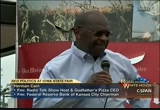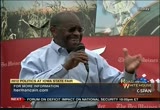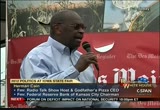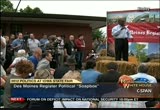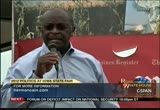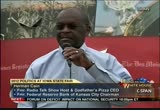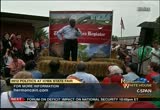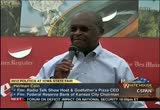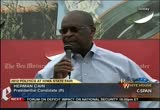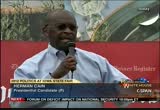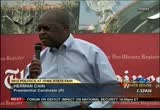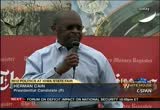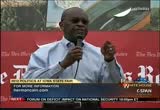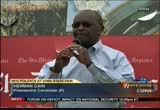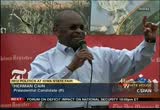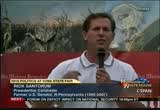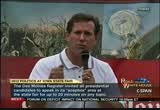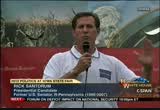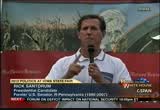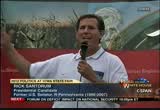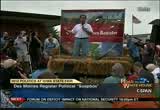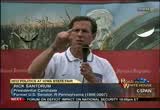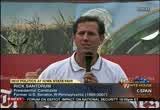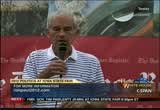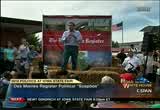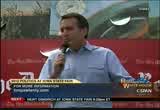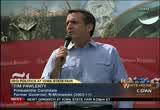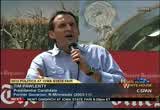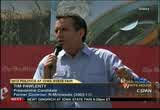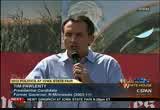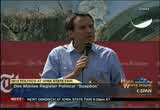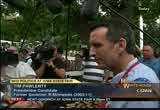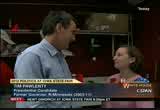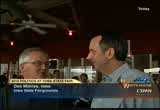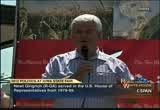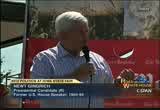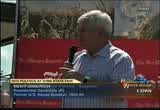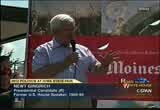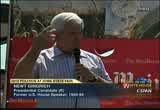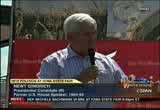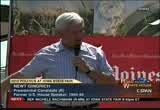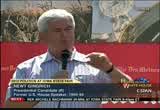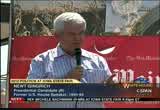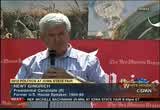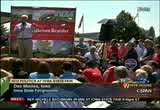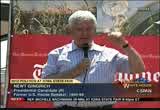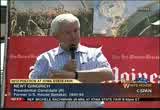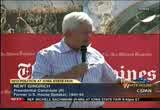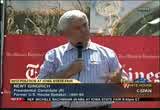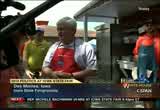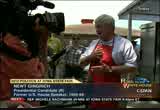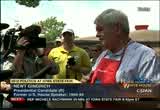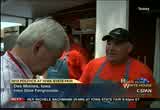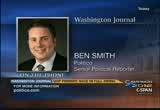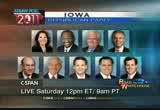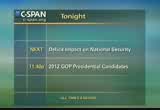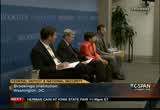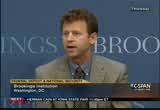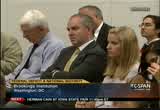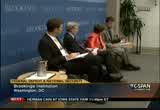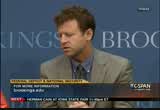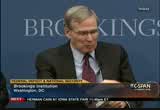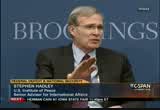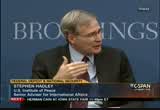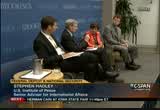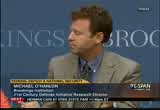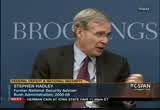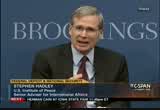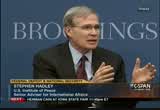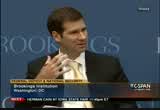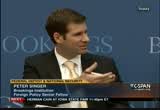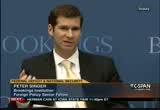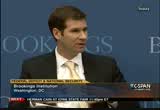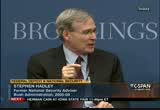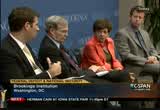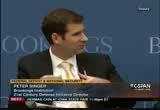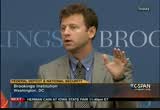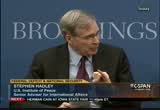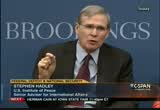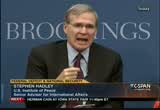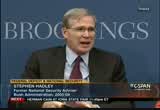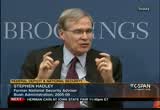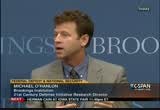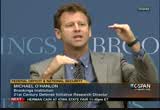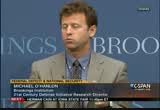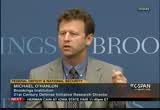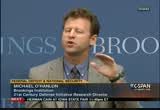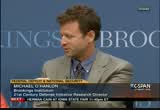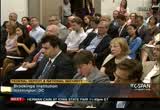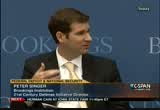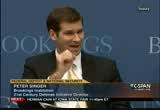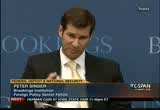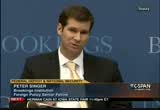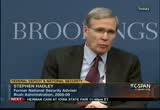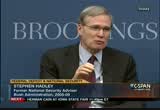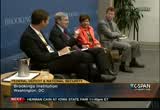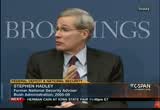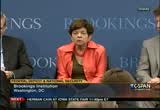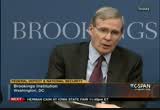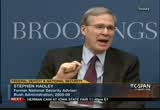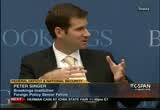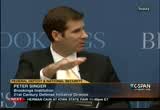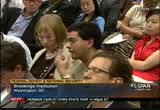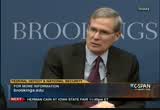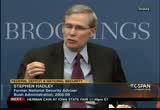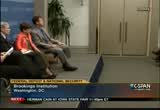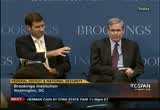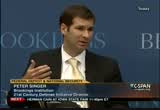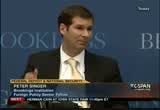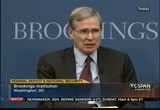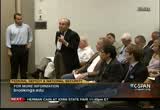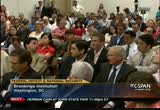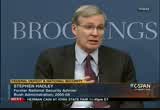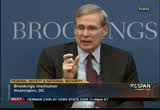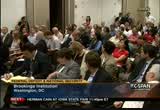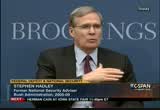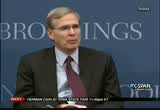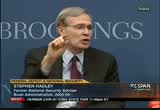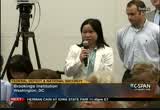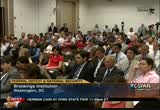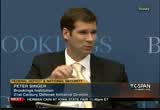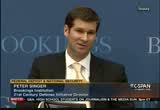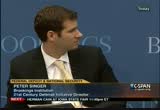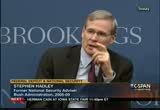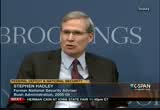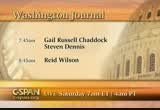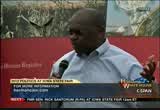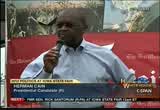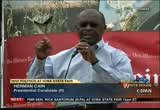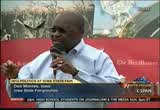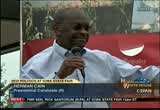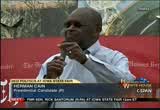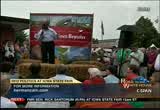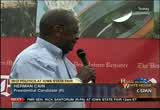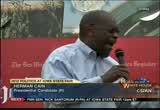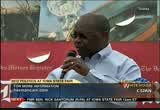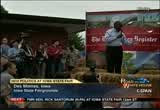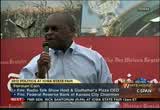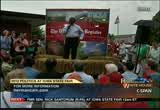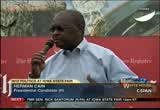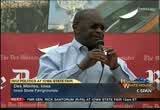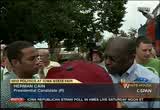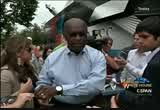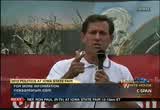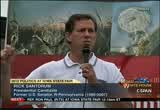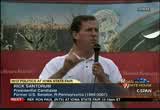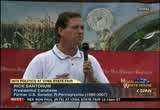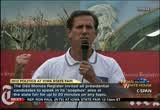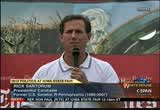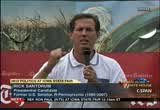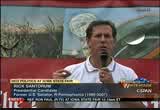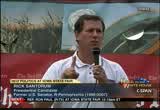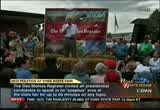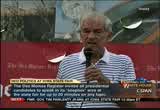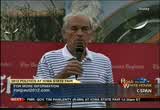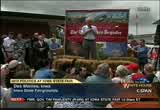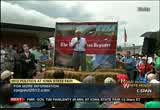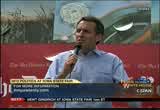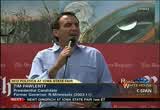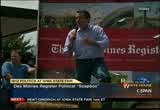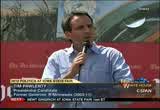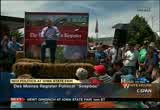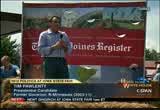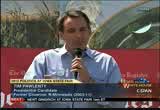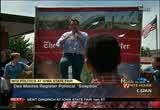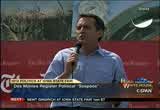tv Politics Public Policy Today CSPAN August 12, 2011 8:00pm-1:00am EDT
8:00 pm
>> tomorrow on washington journal, the debt reduction committee and the work they will be doing. then a preview of the iowa straw poll vote with reid wislong and others. washington journal live at 7:00 a.m. eastern on c-span. >> next on the iowa state fair remarks from republican presidential candidates herman cain, rick santorum, tim pawlenty, em michele bachmann. later, the federal budget impact on national security. 2012span's coverage of the republican presidential race continues with a look at the candidates that spoke at the des moines register straw poll vote. we will hear from herman cain, rick santorum, ron paul, tim
8:01 pm
pawlenty, newt gingrich, and michelle bachmann. we'll also show you some of the candidates' meeting with fair goers. this is just over two hours. >> the 20 minutes does not include the introduction. >> it does. >> get started. [laughter] >> good morning. welcome to the "des moines register" soapbox. our first candidate of the morning is herman cain. he is a former georges businessman. he is seeking the republican nomination for the presidency. let's get and i will welcome for herman cain. [applause] >> thank you.
8:02 pm
good morning. i love that kind of greeting. that is good. it's felt like you are energetic and ready to go. so i am -- so am i.. i am happy to be here in iowa at the state fair. i heard you have something called a pork chop on a stick. i just sent my staff out to get me one. in georgia, we eat pork chops for breakfast, lunch, or dinner. i feel right at home. i am glad you are here. crosses for stopping by. thank you for the opportunity to share a few of my thoughts about this great country we live again. the first announcement i want to make, we are an exceptional nation. the united states of america. [applause] in a cain presidency, i will never do an apology to work.
8:03 pm
we have nothing to apologize for. the founding fathers got it right. the founding fathers got it right when they said "we hold these truths to be self evident that all men are created equal, that they are endowed by their creator with certain unalienable rights that among these are life, liberty, and the pursuit of happiness." it did not say anything about a guarantee. it said the "pursuit of happiness." it did not say we need to establish a department of happy in washington, d.c. we do not have a department of happy in washington, d.c. but the pursuit of happiness is under attack. it is under attack, but we can take it back.
8:04 pm
that is one of the reasons is i am running for president. we have become a nation of crisis, but we can fix it. we have an economic crisis. we have an entitlement spending crisis. we have an immigration crisis. we have an energy crisis. we have a fall in the foreign- policy crisis. the biggest crisis we have is a deficiency of leadership crisis. the biggest one. [applause] next to national security, getting this economy going is a job one. here is how we do it. first, recognize that the engines of economic growth is the business sector, not government. the business sector. in order to get the engine driving this economy, we have to put the fuel in the engine.
8:05 pm
that is why in the first 90 days as president, i am going to ask congress to send me legislation that will lower the top corporate and personal tax rate to 25%, take zero taxes for we appreciate it pockets -- for repatriated profits, and take the capital gains rate to zero and make them permanent. that is that we put fuel in the engine. [applause] once we get the economic engine moving, then we can address a lot of the other issues that we face. you know, when i was growing up as a young man in atlanta, i never said or dreamed that i would run for president one day. that was not what i wanted to do. when i was growing up, i came from a very humble family.
8:06 pm
my mother was a domestic worker. my father was a barber, a janitor, and a chauffeur all at the same time. because that new debt he needed one job to put food on the table, a second job to keep a roof over our head, and that third job to save for his american dream. because just like your parents, dad wanted us to get a little bit better start in life. and we did. he was able to achieve his american dream even though he what all they form at the age of 18 literally with just the clothes on his back. he achieved his american dream the old-fashioned way. he worked for it. [applause] that is one of the reasons i am running for president.
8:07 pm
i want our children and our grandchildren to be able to have the same opportunities that we had. on what our children and our grandchildren to be able to grow up in a nation where we get government out of the way, government off our backs, and government out of our pockets because it has gotten out of hand. [applause] like i said, the founding fathers got it right. -- got it right when they talked about the pursuit of happiness. they got it right when they talked about limits to government. the founding fathers got it right when they talked about individual responsibility and individual liberty. that is what we have got to get back to. when i was doing my radio show in atlanta before i started running for president -- i was on the radio for odd years -- but when you run for president according to mccain-find the old
8:08 pm
rules, you have to become unemployed. so i am now unemployed to run for president. you would think you'd be able to keep a job while you are running. no. those already in all this get to keep their job, but they told me i could not keep my job. i think it is a little bit of a double standard, but that is not going to stop me. because i am learning that the american people have an appetite. the american people have an appetite for a non-politician. i have never held public office. [applause] i am 8 business problem solver. that is what i have done all my life. i happen to believe that those same skills will work in washington, d.c. from the white house. i happen to believe that. [applause]
8:09 pm
when i give my speeches inside the beltway sometimes, i will have someone stand up and say, "your ideas about taxes and replacing the tax code with the fair tax, that all sounds well and good, but you cannot do that." my response is, "what do you mean i cannot do it that?" "if you do not know how washington works." my response is, "yes i do. it does not." [applause] it does not work. why do i need to learn how it does not work? you would be sending me to washington, d.c. to change washington, d.c., not become a part of the problems in washington d.c.. -- problems in washington, d.c. former senator everett dirksen popularized a statement -- "when
8:10 pm
they feel the heat, they will see the light beer "the heat comes from the people. that is you. my job as president is to be a president of the people, by the people, and for the people. not for the politicians, not for washington, d.c. that means i am going to listen to you. -- listen to you, not listen to the lobbyists or listen to the establishment. listen to the people because the people in this country are crying out to the top of their voice. we the people are still in charge of this country and we want to take it back. that is what the people are saying. [applause] when people ask me why am i running for president, like i said, it is for the children and grandchildren. i will never forget when i looked into the face of my first
8:11 pm
grandchild in 1999. i look into that little place in the first thought that crossed my mind was what do i do to make this a better nation and a better world? i did not know the answer then. 12 years later, i believe i know the answer. 12 years later, i believe i know the answer after a lot of prayer, a lot of soul-searching, a lot of prayer and a lot of soul-searching. that is when i made the decision to run. now i love it when people say that i do not have a chance of getting the nomination. that i do not have a chance of winning the presidency. all that does is it inspires me to work a little harder and work a little longer. i love it when they try to count me out. [applause] love it.
8:12 pm
but, you see, here is something they do not know about herman cain -- i have been going against the odds all my life. this is not anything new for me. when i discovered godfather's pizza in 1986, godfather's was supposed to fail. they predicted it would go bankrupt. it did not go bankrupt when i got there, surrounding myself with the right people. why did we fail -- why did we not fail? i did not get the memo that we were supposed to fail. i did not get the memo that america cannot fix its problems. that is why i am running. i had been going against the odds throughout my life. let me tell you about another incident back in 2006. -- back in 2006 where i beat the odds, which is another reason i
8:13 pm
am running for president of the united states. in 2006, i was diagnosed with stage 4 cancer. the doctors told me i had a 30% chance of survival. three out of seven. i said, "well, doctor, i am not going to be in the '30's, i am going to be in the ones that survive." back in 2006, against the odds, i had to go through chemotherapy, double surgery where they took el 30% of my colon, 70% of my liver, full chemotherapy, and now as of two weeks ago today after it might
8:14 pm
latest annual checkup, i have been cancer free for five straight years against the odds. [applause] against the odds. i show someone the letter i got from my doctor with my 5 year clean bill of health, he said, "god did not want to deal with you yet." i said, "maybe he did not, but i believe god wanted me to stay here so i could make a difference in this community and in this country." he said, "not yet." that is another reason is i am running because i happen to believe that we were all put here on this planet to make a difference. everybody can make a difference in a different way. with your talents, your time,
8:15 pm
your treasure, your abilities -- we all have the responsibility to make a difference in this world. i happen to believe that after achieving my american dream that i am is supposed to do something else other than just retire or go into a nursing home. i do not believe you retire. you refocus. you want to do something with that time. i happen to believe that this is what i am is supposed to be doing right here at this moment in time. and i am optimistic that we are going to get this nation back on track because of what i call the spirit of america, the same spirit of america that inspired the founding fathers. the same spirit of america that has brought this nation through some of its most turbulent times. that same spirit of america is
8:16 pm
going to cause the american people to stand up, speak up, and rise up, and that this nation back on track. [applause] i was asked last night after the debate to name a president i would pattern my leadership style after. i said ronald reagan. [applause] ronald reagan. and then the reporter says, "well, he was not perfect." no, but he was ronald reagan. [laughter] you do not have to be perfect, folks. yet to be yourself. people connect when you are yourself. and so it was ronald reagan's
8:17 pm
leadership that helped to turn this nation around. and he did. it is in the same spirit that i am running for president. ronald reagan reminded us of this thing called liberty. -- this think all liberty when he said "freedom is never more than a generation away from extinction." we cannot pass it on in the bloodstream. it must be fought for and protected. one day we will spend our sunset years and our children and our grandchildren -- with our children and our grandchildren. we will tell them what the united states of america used to look like. i am not going to have the conversations with my grandkids. i do not date you want to have
8:18 pm
that conversation with your grandkids. the founding fathers got it right. that is why we must be -- we must become the defending father's. we must defend the at declaration -- we must defend the declaration of independence. we must defend the constitution of the united states of america. we must defend the life of the unborn. we must be the defending fathers for the greatest country in the world. [applause] i happen to believe that we will be able to do that because on our currency, on that money you have to pay for that porkchop on a stick, it says "in god we trust." in the fourth first of the national anthem, there is a phrase in the middle of it that
8:19 pm
says "in god is our trust." that is why i believe that the united states of america is going to get back on track. ncain.com and ian cain.co am running for president. [applause] >> hell are you doing? -- how are you doing? >> we have to define and shape the values. they are reflected in the constitution of the united states.
8:20 pm
>> thank you very much. >> you are welcome. thank you, sir. appreciate it. thank you. appreciate that. [unintelligible] >> i thought that name sounded familiar. i saw him the other night. he was great. >> we are thrilled you are running. >> thank you, barbara. it is good to see you. good to see you. let's keep looking a little bit. do you have your camera? >> i will take a picture of you and the kids. >> me and the kids? all right. how are you. you are seven? how old are you? >> i am 4.
8:21 pm
>> you are for? all right. -- you are four? all fight. say cain. love it. it is good to see you, man. we are hanging in there. when i say inside the beltway, they are very skeptical. but when i say that to regular voters, they always applaud. they are looking for somebody who is in non politics. >> the downgrade in credit and
8:22 pm
the tea party and all that? >> i do not understand the question. quite the thing is, that is what is wrong with washington. they want you to accept the old rules. the american people are saying "we want some new rules. we want to change the rules, otherwise we will never change the country." that is what this is all about. the biggest misconception about the citizens' movement, that is what i call it, it does not just the tea party. every organization that has members are mobilizing their members because they are fed up with what is going on. the citizens' movement is about fiscal responsibility, the free- market system being allowed to do what it does, not being overburdened with too much legislation and regulation and then at legislating to the back door -- people are sick of that. thirdly, recognizing people's
8:23 pm
constitutional liberties. do not rewrite the constitution, enforce the constitution. quite a bit when it comes to gay marriage? >> do not rewrite the constitution. there is a difference between writing the constitution and adding something to the constitution. people are tired of backdoor legislation, talking about increasing taxes. they feel like they are taxed enough already. we do not have the revenue problem in washington, d.c. we have a spending problem in washington d.c. [applause] are we going in here? we are going in here. thank you. appreciate it. >> if you want someone who has actually done it, it is easy to vote no. it is easy to say you are against banks.
8:24 pm
when i was in the united states senate with a democratic president, with a majority of the united states senate, we had 52 or 53 republicans. we needed bipartisan support to pass anything. i put for a welfare reform bill in the united states senate that ended federal entitlements. something we will have to do with medicaid, food stamps, education, and housing programs if we are going to get this budget under control. i did it with income support for poor people. i said this is not a federal responsibility, it is a state responsibility. we ended federal retirements, required work, and put time limits on welfare. i got bill clinton and have the democratic caucus to vote for it. that is the leadership we need in washington, d.c. today. if you want to look at a record of political accomplishment, if you want to look at a record -- by the way, in 2000 and ran for
8:25 pm
election. i was the only conservative elected in 2000 in a state that george bush lost. i've won it by five. if you want someone with a record of accomplishment politically, with respect to getting things done -- it is not in the area of economics. we came within one vote of a balanced budget amendment in the senate. i continue to push for it to melt the time i was in congress. that when i did not succeed on, but it is an issue i need to suit -- we need to push on. our moral and cultural issues. no one stood up and fought for the sanctity of human life as much as i did in the united states senate. i was the author of the partial birth abortion act. it was an abortion measure that wet at the heart of the abortion
8:26 pm
industry. identifying what is in the womb is a child. we finally got this issue out before the american public and guess what? bill clinton kept vetoing it. we kept trying to override. i got 13 democrats to vote for it. they did not start out that way, but one by one they came over. i went to the floor and pounded away. pat leahy, one of the most liberal democratic senators out there, came up to me after four years of this debate and said, "i want to 20 minutes of your time." i said, "you have always voted against me. you want 20 minutes of my time? do you not what 20 minutes a barbara boxer's time?" he said the 20 minutes of your time or i will even vote against you. i gave him 25. he went up, stood there, and
8:27 pm
painfully said he could no longer stand against the white. ladies and gentlemen, that is what we need. we need someone who can look at those cameras, can talk to the american public, can talk to members of congress, and bring the weight of the argument behind us to get this country going in the right direction. i have done it in the toughest areas began. ending federal entitlements, getting people to get on moral and cultural issues -- i have done it in the hardest place to do it in the country. i was able to win elections. i also went on national security. no one in this race as the national security experience i have. i spent eight years on the armed services committee. i was chairman of the subcommittee. i brought a bill to the floor every one of those eight years. every time i was able to get bipartisan support for what i was doing.
8:28 pm
it was moving the country from a cold war first. i was ahead of the curve in doing what was right in reshaping our military. same thing on foreign-policy issues. israel's existence is at stake. it is at stake because we have a president who has turned his back on the state of israel. again, look at it was ahead of the curve. what is the greatest threat to the state of israel? bill asked the israelis. they will tell you. what will they say? iran. who's the person before ahmadinejad was elected to a introduced a bill called the "airline freedom support act?" it was sanctioned on a nuclear iran when the cia was saying they had no nuclear capabilities. president bush supported the bill. bipartisan late, that bill
8:29 pm
passed after being fought by jo bonner and for six months. we got it done. why? because i was right and ahead of the curve doing what was right for the state of israel, but also protecting our national security against iran. if you want someone with a record of accomplishment and a clear vision for what this country needs, to get our country going again -- we need to cut entitlement programs. on with the leader on social security before anybody back in 1994. i was talking about these issues in the midst of a campaign in a state that has the oldest per- capita population. i was talking about social security reform. why? because i knew today would come. it is demographics, folks. for the last 15 years, 300,000 people turned 65. the you know how many are turning 65 in america this year? 1.5 million. it will be that way for the next
8:30 pm
few years. we knew this was coming. every politician doubt. i stood up. if you want someone to tell you the truth, who will look you in the eye and will tell you exactly what the problem is, why the problem is there, and exactly what i will do, then i need your help in ames. it is a very important meeting tomorrow. the national media has done a good job of not paying any attention to our campaign. they took candidates way below me in the polls, which is not easy to do, and give them more attention been made. gallup did a poll in march and july. every candidate for president, every one saw the name recognition go up dramatically except one -- me. why? what does the national media have against a guy who beat three democratic incumbents in a critical swing state?
8:31 pm
i wonder why? i wonder why they are not providing a whole lot a national coverage for someone like me? [applause] ladies and gentlemen, iowa, not the national media, not the political pundits get to decide who gets to be the next president of the united states. i hear it all the time -- i wish we could do something to let those people know what we really think. you can do something. you can go to ames tomorrow and say we want to elect a consistent conservative who can win any election against the best the democrats have to offer and can deliver conservative solutions for this country and lead us in the direction like ronald reagan did. reagan's policies were great. but it was his ability to go out and tell the american public who we are. do we are, ladies and gentlemen, is a country that believes all rights come to us from our creator to each and everyone of
8:32 pm
us equally. [applause] i love the constitution. i love the tea party. but when the tea party says it is all about the constitution, they are only half right. our country with a constitution without the declaration of independence is france. [applause] the declaration of independence -- the constitution is the how of america. the declaration of independence is the why. who we are is a country who has his rights given to us by god because we are creatures of god. what does god give us those rights to do? he did not give us this right to do what ever we want. there are laws. the mosaic code. there is a natural law. there are values that hold this
8:33 pm
country together as a judeo- christian country. those values is what made america america. when they said unalienable rights of life, liberty, and the pursuit of happiness, they said the right to life was invaluable. that could not be violated. it is being violated in america today. [applause] they talked about liberty. look at what is happening right now with obamacare. it is the greatest threat to liberty. it is, in fact, the end to liberty. look at what happened two weeks ago when obama's back was against the wall. what did he do to try to scare americans? he threatened social security recipients that the money would not be there. he threatens medicare recipients that the money would not be there. why do you think he shut obamacare down the throats of
8:34 pm
the american public? because he wants his hooks in everybody. he wants you to be dependent on government. once they get you, your freedom is lost. look at what is going on in britain and greece. it is pathetic. people have become so dependent. but i am not surprised because those people did not come here. we chose freedom of government security. that is what is at stake in this election. [applause] finally, our founders said life, liberty, and the pursuit of happiness. they did not say guarantee of happiness. they did not say provision of happiness. they said that every american would have the right to pursue happiness. but it does not happen is that someone on the far right or the far left suggests. happiness is not the pursuit of pleasure. go look it up in the dictionary.
8:35 pm
happiness is the pursuit of what is morally good. [applause] god gave us right that we could follow his will. our founder, john adams -- every felder said the same -- our constitution was made for a moral and religious people. it is wholly inadequate for the governance of any others. you cannot be freed and live whatever life you want. we will be constrained with change from within or change from without. if we want to be free, we have to be a good and decent moral society. we have to believe in the principles of the family and the institution of marriage. we have to step for those principles because that is where those moral values are inculcated. ladies and gentlemen, you want someone who will go out and remind americans that we do not need a president who believes in government. we need a president who believes
8:36 pm
in you. [applause] please go out, go up to ames. let the national media here you loudly and clearly. you want a winner, he was a leader, and you want someone to go out to the american people and remind us that we believe in ourselves again, not to listen to the siren song of someone who says, "i can do for you better than you can do for yourself." that is not what made america great. america at the time of the revolution the average life expectancy was between 35-40 years of age. get back to the time of jesus christ. average life expectancy was the same. we were antiquarian society 1800 years ago. then america happened. america said, "no, we are not
8:37 pm
going to leap in kings having the rights and people being subject to the king's." guess what happened? in 235 years, life expectancy more than doubled. we went through an industrial and technology revolution. the poorest person in america today is richer than someone who was one of the richest 50 years ago. this is the dynamism of america because america trusted and believed in free people. that will be over if barack obama is reelected and obamacare is implemented because they will put you in chains called obamacare. you will be dependent on government and he will not break away. final comment -- margaret thatcher when she left said she was never able to accomplish
8:38 pm
what reagan accomplished in america, to transform a society to believe in itself again, which reagan did, and and this march towards socialism. the recent she said that -- the british health care system. ladies and gentlemen, do not be the generation after 235 years that day but freedom with a whimper. stand and fight for freedom. thank you and god bless you. [applause] [applause]
8:39 pm
>> i am carol hunter, politics editor at the des moines register. our next speaker is representative ron paul, the congressman from texas. he is seeking the republican nomination for the presidency. representative paul. >> thank you very much. [applause] thank you very much. i am glad you are out this morning. i was just wondering, how many will be in ames tomorrow? that was good. maybe we can get a few more of you to come as well. most people no white candidates are in iowa this week and what is going on tomorrow. it is delightful to be here and attending the fair. enjoying the weather as well having come from texas just recently. it is great to be here, but of course, the real thing that motivates me is the issues i think have been messed up in our
8:40 pm
country and that we have to change our way. we have to change our direction. the american people are pretty tired of what they are getting. they know there are serious problems. there is a lot of anger and frustration going on. a lot of unemployment. somebody ought to come up with some answers. well, a few years back in the 1970's, i first ran for congress. i was concerned about what was happening then. i believed the stage was set for the problems we have today. it happened back in august of 1971. that was at the time that we decided that money did not matter. we could print the money. there should be nothing to back our currency. we could print the money and live happily ever after. that means that we believe as a people that if we could carry it our own money, we could live and not have to work anymore. what did we end up with? a huge amount of debt. we owed $3 trillion to foreigners. our jobs have gone overseas. now we are deeply in debt and
8:41 pm
there is a debt burden and they are very frustrated in washington, which makes it frustrating for the people across the country. a lot of people become dependent on the government. we are doing way too much. my simplest explanation of our solution is we have to drastically shrink the size of our federal government. [applause] most people are starting to realize this. the big argument is where are we going to shrink it? people say, we need bipartisanship, compromise, and sacrifice. my argument is we have had too much bipartisanship. it is the bipartisanship that has endorsed all of our problems. if we elect republicans to shrink the size of government, they doubled the size of department of education and get us involved in a bunch of wars. we elect democrats to and the war's end the expand the wars. then we have republicans that expand the budget and democrats are doing the same thing.
8:42 pm
there is always this compromise. there are the big spending conservatives and big spending liberals they get together and they do not have to worry on the short run. but it always delay it. sure you can tax to a degree, but there is a limit to how much you can tax. it can bar to a degree, but if you borrowed too much, interest rates go up. there is a magic answer to this. it is called keynesian economics. just print the money when you need it. that is what 1971 was about. no restraint on the monetary story. all our problems in the last 40 years came from the fact that the government has subsidized and taking care of by the printing press of money. right now, the american people are starting to realize it has a lot to do with our monetary system. they know that prices go up when the value of the money goes down. they are not very happy about it. the standard of living goes
8:43 pm
down. people can make a little more money and the jets can go out, but if the money value goes down, that is one of the reasons people are very upset. people on retirement, people getting social security are starting to recognize this. the tragedy here is that the production in this country is down. productive jobs have gone overseas because of this monetary system, over regulation, and over taxation. we chase our jobs overseas. in order to get capital back in, you got to have a strong currency and a tax code that invites our business is back rather than chasing them overseas. it is sad to me to think that in my lifetime we sell a point where there was a country called communist china evolve into being our banker. beer is something about that, and we should reverse that, but we have to endorse a very basic principle -- freedom and the constitution. [applause]
8:44 pm
since it was bipartisanship that got together and spend all the money, how do you get out of this mess? how'd you get people to agree to cut spending? that is where the difficulty is. there is no agreement in washington. what i have done is try to propose a way to get the two sides to come together. an area we could most easily cut is what we spend overseas. we spend way too much overseas. we have an american empire overseas. we spent trillions of dollars. we are obligated to spend trillions of dollars taking care of the seriously wounded individuals coming back home, which we are obligated to do. we passed out all this foreign aid for national security. all of this militarism does not help us. it does not make less secure. people will not vote against it because if you vote against the military budget, not realizing
8:45 pm
all you are doing is giving subsidies to the military industrial complex, they accuse you of being on american and not caring about the military. i will tell you what, that is the way i have been voting and i am very proud of one thing -- during this campaign and the last campaign, our campaign always raised the most money from the military people more than all the other candidates put together. [applause] having served in the military -- i was drafted in 1962. i was in the air force for five years. i understand what it is like to have a bad war going on and people being spent -- being sent around the world. we should be able to have a nonintervention for policy based on moral principle that you do not initiate wars, you do not
8:46 pm
fight unless it is constitutionally declared. there is a very simple answer as far as i am concerned about how to start off by saving a lot of money. that is stay at the business of the other countries, like our own business, and bring all our troops home. [applause] that means the middle east, japan, germany, south korea, the whole works because if you do that one thing instantaneously, and the president's it does have the authority to move the troops around, if they are going to get paid all this money, let them spend the money here rather than in japan and germany. psychologically we will give a tremendous boost to our economy. but you got to change a lot more than that. you got to change the nature of what the people want. the appetite for big government has been around for a long time. there is a lot of blame to go around. he complained the president,
8:47 pm
congress, the philosophy of economic -- you can blame the president, congress, the philosophy of economic intervention. congressmen have, over the years, voted for these things and got an reelected. government, very frequently and most likely, will reflect the attitude of the people. that is why i am interested in changing the attitudes and understanding of the role of government. what should the role of government be? should it be to police the world and finance a welfare entitlement system, or should it be as the founders wanted and our constitution dictates that the purpose of the constitution is to protect your personal liberty? [applause] liberty comes up to us in a
8:48 pm
national -- natural way. you should have the right to life and liberty. you ought to have the right to keep your own money. [applause] that would solve a lot of our problems. the other goal in my effort to spread the message of liberty is that to have an understanding of liberty, we have to get this splitting up of what freedom is about into two branches. one says you can live your life as you please, which sounds like a good idea to me. the other says we want to run your life but allow you to spend your money as you please. what would be so bad to have a country that says you can live your life as you please, run your life as he pleased, and spend your money as you please as well? [applause] but the correction has become not only with the change of our foreign policy. we have to deal with the
8:49 pm
monetary system because it is coming to an end. the financial markets are in shambles. they have been that way for several years and it will get much worse because we are trying to correct 40 years of mistakes. 40 years of debt accumulation and investment. the one thing that is a little difficult to understand what is an important economic issue, if you have a pile of debt, in order to get growth again if you're spending all your money to pay interest, it does not work. that is what you do not bail out bad debt. that is what the bailouts were so bad. all the people who make all the money got your money and you got the bad economy. [applause] if an individual is bankrupt and has too many credit cards or two-minute cars and they lose their job or -- too many cars and they lose their job, they know they have to cut back, cut the credit cards, sell a couple
8:50 pm
of cars. once they get out of debt, they will be under control again. politically it is virtually impossible for the politicians to do that because there is always one groups saying do it because i want to keep what i earn. there is another group saying no, you're going to cut my check. they are getting very angry. this is a worldwide phenomenon. it is not just the united states. it is because we did issue this funny money, this paper money. paper money never works. and never last, just for a short period of time. the real money has always been something with real value, like gold and silver. we had the privilege of printing it, sending it overseas, buying this and services, living beyond our means, accumulating debt, allowing three trillion dollars in debt now. what did the foreigners do with the money? the loan it back to us. the u.s. treasury bills as the reserve. that became the gold standard.
8:51 pm
the worldwide phenomenon -- it will not last. that is why there are a shambles and the markets today. by next summer, you're going to have a lot more price inflation because all they have been doing in washington is spending and inflating. we got into trouble because we were spending too much and regulating too much, taxing too much, and turning too much money. they recognize we are in deep trouble and we have to do something about it, so they accelerated the spending, borrowing, the regulations, and the spending of money. and we wonder why things are not getting better. it would be logical to expect that if you try to treat a problem by doing more of the same, it is not going to work. all of this can be summarized by defending liberty. that is what america is all about -- liberty and freedom of choice. we had the largest middle-class
8:52 pm
in the wealthiest country in the world and we are losing it. the middle class has been shrinking significantly for 10 years. we are losing our jobs in this country, but this can all be reversed. it is not difficult. understand and respect where our liberties, from in a natural, god given way, defend that and have confidence it does work, and also, what fits in so perfectly with this, all you have to do to achieve this is ask anybody that you vote for how serious are they and how consistent work day in defending the constitution. if we get back to the constitution, we are going to solve just about all of our political and economic problems. thank you very much. [applause]
8:53 pm
[applause] >> thank you very much. good afternoon. thanks for the opportunity to share a few thoughts with you about the future of our country. before i do that, i want to introduce a special guest -- my wife, mary. she is a big part of our campaign. i know she would like a chance to share a few thoughts with you about the great state of iowa and our great country. mary pawlenty. >> thanks for being here. you are out piercing one or to get a politicians along the way. i hope you are enjoying your afternoon. we love going to the minnesota state fair, too, of course. i appreciate iowa. we have come to understand, truly, how ingate you are, how people are genuinely asking really good questions of all the candidates.
8:54 pm
it matters. it matters, not only to iowa, it matters, more broadly, to our country and, ultimately, to the world. thank you for doing what you do best. i wanted to say a few things about my husband hopefully you will have an opportunity to ask them some tough questions. i would like to tell you a little bit about who he is. obviously, you see him in his political arena, but we have been married almost 24 years. we have two kids. we have one going off to college this fall and one who is 15- years old. when i say that i support my husband, i support him not only because i love him so much, but i support him with my head. i have watched him through tough times. i have watched him through tough times and bad times. i have seen him do it all. all of you who have been in long-term relationships have.
8:55 pm
i know his head and heart is genuinely connected. he has his compass said. he is someone, i think, if you got to know him, he is the kind of person you would want as our neighbor. longtime friends and longtime neighbors, you know this is the person you would like to, not only be your friend, somebody you would like to go along side with, but someone you can genuinely respect as a leader. i am copper that that he is the person who has respect, judgment, character, strength, and experience to be the next president of the united states. these and gentlemen, once again, my husband, jim pawlenty. >> i know you are out here to enjoy the fair, weather, food, and the like. i appreciate you coming by. i want to address jobs in the economy. if there are questions, i would be happy to take them.
8:56 pm
one of the main issues facing iowa and for our country is whether people have access to jobs. as we have a chance to go around and ask each of you what matters most, i think we would hear about your family, the importance of having housing, i think we would hear about your concerns for putting gas in your car. i think it with your concerns about being able to pay your health care. all of those things and more, taking care of your kids, getting them on to college require money. for most iowans and most americans, the way to get money is to have a job. i think one of the best questions we can ask and answer in this public debate and policy debate is what are the things we can do to make it most likely that jobs will grow in this country? if you do not have access to a job, you're like it's pretty tough in a big hurry. that is the issue. we have had three years of so of
8:57 pm
president obama's direction. we have to step back and ask how it works. the answer is, not very well. we have a crushing levels of unemployment. we had nearly $4 a gallon gas. we have the federal government that seems out of control and incapable of getting spending under control. we have an economy that continues to point towards instability and, they become a decline. it is not susceptible to america or iowa. it undermines our ability to provide a pathway for quality of life to our citizens. we should talk to the people actually providing jobs. there are 6 million companies in the united states of america. 5.9 million of them have a 500 employees or fewer. most of the jews in the economy is in small and medium-sized -- juice in the economy is in small and medium-sized businesses.
8:58 pm
the board and has gotten too heavy. the costs have gotten too high. they talk about taxes being too high. they talk about regulations being too heavy. they talk about energy costs being too expensive. i talk about health care costs going to the roof and being unable to keep up with it. if we do not address those concerns, we cannot provide the quality of life to the citizens that we want. what we do about that? we turn to our government and say we are going to take it back and go get a better direction. i have the most specific, most aggressive pro jobs plan of any candidate in this race, including the president. it is available on timpawlenty.com. we have to get the business tax rates from the most expensive and the world to more competitive so our companies can compete. our companies get attacked 35%. we need to bring that back in my purse or so -- in my proposal
8:59 pm
under 15%. the business' ability to compete depends on your ability to connect to customers, not the ability to influence congress. have a flat, simple tax rate. [applause] most of our small businesses in this country and job providers pay their taxes on their own individual returns because of what is called "past due entities." they do not pay the business or corporate tax rate. they pay it on individual returns. it is important that we do small eliminate taxation on interest dividend capital gains on the estate tax. that would call for an energy policy that is an american energy policy, not a middle
9:00 pm
eastern energy policy. [applause] we need to fix a health-care reform the right way. if you like the approach that president obama takes on health care, a vote for him. you have government employees and bureaucrats run it and then you tax people more to pay for it is not a good plan. in the long run, that is not going to best serve our people. it is going to be financially insolvent. we have an out-of-control health care system, but it has to be fixed the right way, like i did in minnesota. game, with better information about quality and price. we have to pay providers just not for volume of procedures, but we've got to make sure they
9:01 pm
are actually getting paid for better health. then we got to let in on the regulations more broadly. a lot of business -- they say, yes or no if i need a permit but tell me quickly. so there is a whole proposal about regulatory reform. i want to get to your questions, but i want to close with one overarching thought i think some of this whole debate. that is this -- if you think about what separates the united states of america from the rest of the world, it is not that we are the biggest country in population -- we are not. we are not the cheapest country in the world, although we do need to be more competitive. if we are not the biggest, and we are not the cheapest, what is it that has made us the most successful, exceptional nation the world has known? the answer is, we are the freest country in the world and when people are afraid they can do a number of things. they can dream as they see fit. they can invent, create, they can design. they can associate as they see
9:02 pm
fit. they can worship as they see fit. they can speak as they see fit -- like this german does. that freedom unleashes in the human potential the ability to say "i can do this. " it is fundamentally different than most other cultures throughout the globe through most of time. when the government comes and say, you know what, we are going to take over, where they say we are going to make it more difficult, or they will tax it or regulates it or make it slower or discourage it, they not only run of their budget but they do something else that i think is equally or even more corrosive to the country, and that is, they weighed down the american spirit. they weighed down and discourage the american people. you have people all over the country who are discouraged and war. not because of themselves, not because they lost faith in their family or their church or neighborhood or community, but they lost faith in their
9:03 pm
government. they lost faith in their government. what is going on with that, people say barack obama had his chance. he came through iowa and other places and he said both for me, and he had great speeches and rhetoric. the great speeches did not put gas in my car, great speeches to not pay your mortgage, great speeches does not pay your health care, great speeches does not buy your groceries. [applause] so, what we need to do is this -- tell barack obama that he had his chance. it's not working. and if you like the way the country is going, vote for him. but if you want to get this thing moving and grow jobs and gas prices down and get the federal government under control and get results -- not based on flapping your job and getting fancy speeches, it is getting it done like i did in minnesota. thank you. i'd be happy to take your questions.
9:04 pm
thanks a lot. all right, who's got a question? sir. >> we have been hearing a lot of candidates talking about jobs overseas, keeping them here at home. i read every port that a lot of the candidates have all of their campaign material contract overseas and not in this country. >> question from this gentleman over here with the super-t- shirts on. talking about candidates saying growing jobs here but they are making or ordering the materials from places overseas. that is their prerogative. the direction i have given my campaign is to buy american, and to buy it from here. yes. >> my name is gabe and i am from the great state of minnesota. i wanted thank you for speaking to us but i want to address one concern, and that is you have not stood for me and my friend.
9:05 pm
you have not stood for us. that is really hard for me as someone who supports the national organization for marriage, someone who stands for the definition of marriage between one man and woman -- i thought our country was about life, liberty, and pursuit of happiness for everyone, no exception. i want to know, when will you stand up for me and that is what i want to know from you today because you are discriminating against me, and it hurts, it really does. >> the german and a friend is asking a question about gay marriage or traditional man ag -- the gentleman in front here is asking a question but a marriage. i understand we have a difference of opinion on this issue. let me give you my perspective and i am sure you will give me yours or have giving me yours. from my perspective, i am not the point nor i him every -- ever at the point saying every domestic relationship is the same as traditional marriage. the relationship between a man and woman in a traditional marriage is important for our
9:06 pm
country, society, and coulter and i think it should remain elevated not just in our words but under our laws that is why i supported and offered laws as marriages between a man and woman. >> i support that you have your moral values but that is something that is hurting my future and how i get to live my life, and that is something -- for someone who talks about government that gets out of your lives, why this government get involved in our marriages. >> the question -- the german ones to know why the government is dead -- gentleman wants to know why the government gets involved. i think every state has an history of the country laws defining or addressing marriage. this is not a new thing, but an important thing. we would just have a respectful disagreement, sir. go ahead.
9:07 pm
with the nebraska shirt on. [inaudible] i think the gentleman was asking about the cut line of large versus small. the statistic, 6 million or so businesses -- 5.9 million or so have 500 employees or fewer and most of those have 100 employees or fewer. >> is anyone towards a bad -- this will be the last one. turkey ranch -- turkey hill ranch. >> and the arab world, 99.9% of the land mass is owned by arabs. and you tell me why they cannot find room for a palestinian state other than israel? >> the question about why we can't get a palestinian state -- >> why doesn't have to take land from israel when they own most
9:08 pm
of the land? >> the question about land available other than from israel for a palestinian state. it is a long and involved issue with a lot of complexity. we should stand by our friends in the world, we should stand by them strongly. one of our best friends in the world is the nation of israel. we stand by them shoulder to shoulder. there should be no daylight between us and israel. unfortunately the current president has repeatedly stuck his thumb in the eye of israel in a way that undermines the friendship and undermines their security interest and ours. it is not helpful to them and not helpful to us. now you have been denied as nations -- united nations or people -- declaring, this anemic organization, think about declaring a unilateral palestinian state without israel's concurrence or agreement, without america's
9:09 pm
concurrence or agreement. all it would do is reflect a coalition between hamas and fatah. pick up the hamas charter -- the words and tones stand for the destruction of israel, hostility towards the united states. we should not have the united states or anyone else unilaterally imposing anything on israel. thank you for coming out. i know the sun is hot. i appreciate you being here and i appreciate the chance of sharing a few thoughts with you and i hope you'll come to the straw ballot, vote for my campaign. turn. [captions copyright national cable satellite corp. 2011] [captioning performed by national captioning institute] >> good to have you back.
9:10 pm
>> ready? i want to get in the front row. you have to have a plan? what is the plan? >> you need a pan. >> are these ready to be flipped? what do you think? ready to roll? all of them? >> table at the time? >> you are good. >> where you from? >> northern iowa. not far from minnesota. about 10 miles from minnesota.
9:11 pm
>> what kind of operation the you have? what is that? [unintelligible] >> pretty busy out there. >> i missed the. i have been gone all summer, so i have not been able to grow. is that rachel's left that i hear back there? >> are you just try to poke me? >> it is really important in the sense it is the first test. the early states are important, and we look forward to competing in all of them, and the first up
9:12 pm
is iowa. -- step is iowa. [unintelligible] >> what kind of -- [unintelligible] >> does this make or break for you? >> i am confident we are going to do well at the iowa straw poll tomorrow. our goal is to move toward the front of the pack. i think we will. well, i make a mean pork chop. is not about rhetoric. it is about results. if you look at my record on results in minnesota at growing jobs, cutting spending, health
9:13 pm
care reform the right way, those are the things republicans and iowa people, and everyone across the country wants to see. what do you think? flipping them? take the rest of these off? >> there has been a lot of talk in this race -- [unintelligible] >> it really does not. >> do you still believe you are the rit man for the job? what do you bring? >> i bring a record of results. i have cut government spending to historical lows, cut government spent -- cut taxes.
9:14 pm
9:15 pm
>> that is good. >>nd if you do not do well tomorrow? >> i am confident we will do well. >> if you do not move from the back of the pact to --for the front? >> we're confident we can get that done. >> will you have to quit? >> you did not give me a very good, complete answer. >> i thought it was really good. [unintelligible] i felt really goo about it. i thought it went well for the campaign, helps to advance the message about getting things done. >> a lot of people are focused on the words between you and michele bachmann. is that part of the debate?
9:16 pm
>> the back-and-forth between her and die, the question that was as was answered, and there are some differences between the candidates, and that started to show last night. we have never been close social friends, but we have always worked together. she has done some wonderful things with her life, but her record of results in congress is really nonexistent. if we're going to have a nominee and ultimately a successful candidate and president, that person is going to have to have leadership and results, not just giving talks about it. >> de think she is done? >> we will just wait and see. >> how does the overall debate change? >> i do not know if we will know the answer of that tomorrow, but all i can say about the momentum is from my standpoint it went very well, we are happy with results, and i will add to
9:17 pm
our momentum going into the straw poll. we are waiting for the pan. i am going to have to go. thank you for the opportunity. [laughter] thank you. good to meet you. wants to do it here? >> he is a political science major. i told her we would get a picture. camera? here we go. >> did it work? thank you so much. really nice to media. -- nice to meet you. >> where are you studying?
9:18 pm
9:20 pm
9:21 pm
>> one time i was golfing with the guy who got a hole in one, and he was supposed to be at work. >> it is good. no i am here. >> what have you been doing to get some nshine? >> we do a little fishing. i like to be outside. i try to save my vacation during the summer, where a short week, and go fishing. we have a whole light. -- lake. sun valley light, it is a little private lake. >> how was the water quality? >> unbelievable. >> fish? >> good fish. [unintelligible]
9:22 pm
9:23 pm
[applause] >> it is good to be here. thank you all. isn't it great to be at the iowa state fair? this is actually the best state fair in the country. it is the this time we have been here, and our grandchildren, maggie and robert, are with us. and he'd pick up where we talked last night about urgency, about getting things done, and about working at a time when you have to go different parties involved. -- when you have to make different parties involved. i worked with ronald reagan and we developed the program. we had to find a way to bring the american people together, so that they would say this was the right thing to do. tomorrow is the 30th
9:24 pm
anniversary of ronald reagan signed a three-year tax cut that launched the recovery that enabled us to create jobs for year after year, and it could only have been done by having the american people bring above democrats and republicans together. when i became speaker, with the contract for america, we had republican house and republican senate, but we had a democratic president. under our constitution, that means you have to find a way to work together. the trick is, we fought very hard, but we also fought with the idea of finding a way to make things work. when we pass welfare reform, the most successful entitlement reform of your lifetime, half the democrats in the house voted for welfare reform, because the people of the united states had concluded that giving people money for doing nothing was destructive, and so there was a
9:25 pm
genuine bipartisan coalition. when we passed the balanced budget -- people say bill clinton takes credit. he was president. he certainly did at least half the credit, because if he had not signed the bills, we cannot have done it. the you have to find a way to work together even if at times your having arguments. i want to start with the idea, what if we took seriously the current problems of the united states, and what have we decided that we, the american people, going to insist that politicians in washington learn to work with each other? i want to bring three specific proposals to you today. this is not about what i would do in 2013 if i were president. we have problems we need to solve this summer, and we need leadership that is willing to work to solve it this summer. that is why it is so important to work now to do things this summer. [applause]
9:26 pm
i am going to give you three proposals. that are predicated on you convincing the members of congress to come back to washington, cut off their vacation, and decide that this is a serious enough situation that we are to start over. notice what i just said. if all they are going to do is come back on both sides to fight each other, they ought to stay home. it does not do the country any good to have people come back just to fight. but if they would be prepared to say this is a serious enough crisis, we are going to start over. erase the board, and i would include in this the gang of 12, which i think it's a disastrously bad idea. let me talk to you about how i would do it. the first rule is going to sound silly, and all i want you to do is bear with me for a second, because i did spend 20 years in the u.s. congress and i have been studying this business
9:27 pm
since august of 1958. the first rule is, in both the house and senate, for the first three days of the week, monday, tuesday, and wednesday, they only bring up things they agree on. this first of all requires them to find things they agree on. otherwise they will look stupid and there'll be no business. second, what it will do is the opposite of what we have been doing. we have been building issues bigger and bigger and bigger. now is either you have to raise taxes and i won't play. you have to cut taxes are i will not play. it has become such a big disaster that now they are saying let's play stupidly. that is not any way to run a country. if you can find a way, step by step, that you could agree on
9:28 pm
something, let's pass it. you will get a lot of small things done, and you will start to build a habit of working with each other. i tried to convince the senate republicans when they were in the majority that one of things they should do is find junior democratic senators that have good ideas and passed them. just to create a framework. people tend to forget that in 1984 when the reagan administration was being too slow on apartheid, a number of junior members worked with ron dellams on what was a very heretical coalition. we said if you believe in freedom, you have to believe in freedom in south africa. you had young republicans have been a senior democrat pass legislation that neither leadership thought to pass. we are going to get together and get outside arco caucus and conference and find ways to find
9:29 pm
things we can agree on. it would start to break the ice. people would start talking to each other and it would get a little better. second, instead of waiting for november for a super powerful, extraordinarily brilliant 12 people to do the work of 522 other people, i would argue -- and by the way, iowa is one of the places i have gotten this from, that they ought to come back and monday, and every subcommittee in the house and senate should be assigned the following task. take every aspect of government your supervising, bring in experts from business on lean six sigma, and apply it to rethinking the whole thing. i will give you an example that will surprise some of you. our legal visa system is a mess. it is an embarrassment. it makes it more expensive and more difficult to be legal and it is to hire a coyote and come
9:30 pm
in illegally. i would take lean six sigma and over the entire state visa process. this was first done in government and iowa, in order to redevelop the business attraction program by applying this kind of thinking to make it faster and easier. the developer believes it is worth $500 billion a year. the entire supersecret intelligence committee of 12 is only trying to get $1.50 trillion over the next 10 years. that is a very different approach. we have talked with ibm, american express, and visa. they have very sophisticated anti-fraud systems. the u.s. government has no
9:31 pm
effective anti-prod system. if you apply prod system to medicare and medicaid, you could save up to $100 billion the year. if you applied to food stamps, it could save $20 billion a year. i just saved in that one device almost as much money as the entire committee of 12 is going to try to save, but it is a new idea. it is a different way of thinking things. it is not conservative or liberal. is just being smart and applying modern techniques and management to do things intelligently. i second challenge to the congress is simple. starting next week, actually have every member doing their job, track every member, and every month, find savings. have as your goal pre-empting the committee of 12 by finding enough savings before thanksgiving that you do not need them. the new can add intelligent savings.
9:32 pm
-- then it you can add intelligent savings. i am against an arbitrary $500 billion cutting of defense. i think it is a stupid idea. i think you ought to have a level of national security you need to have to defend that threats against you. while i am a halt, i am a cheap hawk. i think if you apply lean six sigma, you would save an immense amount of money, but it would save intelligently by taking out waste rather than cutting out programs because you cannot figure out how to manage. it is a fundamentally different approach. we desperately need to get this economy running again. let me be very clear. every american of every background should be worried. i don't care if you are rich or poor, what your ethnic background is, your geographic
9:33 pm
region, i don't care which party you belong to. we are teetering on the edge of an economic disaster. look what is happening in europe. look at the riots in great britain. look at the collapse of greece. look at our the italian and french bonds are today. look at the bubble in china which is eventually going to break. say to yourself, how comfortable am i that the current policies are going to avoid the depression getting even worse? as a historian, i am not comfortable at all. when you bounce along at 9% unemployment, you have a grave risk of sliding down rather than growing up. a third challenge to congress is to come back on monday, and let's start with a couple of things. six democratic senators have sent a letter to the
9:34 pm
president's asking that their states be allowed to drill offshore. you can put together a bipartisan majority in favor of liberating american companies on american soil to produce american energy, in order to be in a position you do not have just sent $400 billion a year overseas. i got some heat from some conservatives because i favor ethanol. i voted for gasohol in 1984. ronald reagan signed it. we had a simple. if our choice was iowa or iran, we like having money in iowa. we would rather have money in south dakota than saudi arabia. i talked to a lot of sophisticated ethanol people and
9:35 pm
i believe in it. i believe in it years ago. i thought was right for national security. i believe that all american energy -- most of the ethanol people i know are prepared to eventually get rid of the subsidy if we move to flex fuel cars and tanks so the customer has a genuine choice. as oil prices go up worldwide, ethanol becomes general it -- genuinely commercially competitive, if you have a gas station that carries it and a car that uses it. i reject those that say we have to do exactly what big oil wants. i am for drilling offshore and opening up lots of land for oil. i think american oil is vastly better than iranian oil. but i am also for ethanol, solar, and wind.
9:36 pm
here is a fact you should keep in your head. we have more total energy in the united states than any other country in the world. we have more total energy in the united states than they have in russia. you have a federal government which is anti-american energy. it just boggles the mind. i don't want to get involved in an ideological fight. i will oppose this example. there are a lot of things we can do. i hope the house will repeal immediately the dog-franc bill, which is a disastrously bad bill. you go into any community bank in iowa and ask about the devastating impact of dodd- frank. we need to repeal sarbanes oxley. it does no good.
9:37 pm
it is just a dump bill d --umb bill. we ought to have a national conversation about this. we own 69% of alaska. 69 percent of alaska is federal land. alaska is twice the size of texas. that means we currently have in federal land 1.5 texases. surely we could designate one half of texas as national parks, forests, wilderness areas. that would be 125,000 square miles. and then we could say with the rest of alaska, what if we could find minerals, oil, gas? that means to be opening up an area the size of the entire state of texas.
9:38 pm
if governor harry gets in the race, he will tell you, that is a really big area. there is no reason we cannot have an honest discussion about this. the roosevelt created -- i get some heat from the far right because i really believe we ought to have a healthy environment. how conservative you are, having a river in the middle of a city catch fire is not a good idea. i wrote books called -- saying there should be a common sense, green conservatism. i am happy to have a dialogue with everyone in the country that says, can we identify a large parts of nevada, parts of alaska, and get back to being a country that favors economic
9:39 pm
development, favors job creation, favors the production of resources? you notice i did not talk about what i would do in 2013. i came to recruit you to call your senators and congressmen to say to people, we need leadership this summer. we need action this summer. as far as i am concerned, i want to be a citizen this summer helping my country get back to work, helping my countries of its problems. we have plenty of time to run for president later. thank you very much. good luck, and god bless you. [applause] is former house speaker newt gingrich with his wife. >> these look good. >> pretty good technique. >> i could to the other thing.
9:40 pm
9:41 pm
>> we have flipped everytinhing that needs flipping. >> i want to know which one of you is from the food channel. >> how do you feel about last night? >> good. we have ou grandchildren here. how could you not be happy at the state there? >> how do you describe the atmosphere here? what is a like to get out and talk to people? >> it has been clear all day
9:42 pm
today. people keep walking up to me and speaking well of last night and promising to be with us in january and getting pictures and walking with me. you will see how many tchers -- people are excited about what we are doing. >> sarah palin is here today. rick perry is here today. >> the more the merrier. we have six months to have a national conversation about the right policies in washington. as i saidast night. , i wish there were immediate things that they could do to start turning around the economy imdiately, starting with repealing the dodd-frank bill. showed the country that they understand we are in real pain. in the house, if republicans have real control, they should
9:43 pm
have all the subcommittees' to the right work in september and find all the money we need to find in september and october by having all 435 members do wor, not just the six members on the house committee. i thought last night was a great place to start talking directly about that. we need to replace the select committee with the whole congre. do something to help america now. >> how does your campaign moves forward? >> we never invested here. our goal is in january. we are looking forward to january.
9:44 pm
mental health, alzheimer's is a $20 trillion public and private cost bite 2015. i want to talk about new and different ways to fix america. that is what this campaign will do. we are attracting more and more people with that kind of a positive message. it makes for a very different coalition. otten involved in politics are sayg, this is about my family and m life. i want to be involved. ry much. you vert
9:45 pm
9:46 pm
>> without further ado, from waterloo, minn., michele bachmann. [applause] >> hi, everyone, from one island to another, my name is michele bachmann -- iowan to another, my name is michele bachmann. i am running to be president of the united states in 2012. [applause] did anybody catch the debate last night? we sent a signal all across the united states, and it is this. with your help tomorrow, in ames, iowa, we are going to make barack obama a one-term president.
9:47 pm
[applause] it does not get any better than that. it is going to be a great election coming up, and you're going to send a signal. this is where barack obama got his start. this is where he is going to come to his and, in iowa. -- end, in iowa. did you get the change and the hope you believe in? it is time for real change. we're going to repeal obama- care. [applause] and today the 11th circuit court of appeals already made their decision that unconstitutional individual mandate is unconstitutional. as nominee of the republican
9:48 pm
party, i will not rest until i elect 13 more titanium-spine senators, and we are going to repeal obama-care, dodd-frank, turned the economy around, and it will not take more than three months to get the whole shooting match up to speed. we're going to do it. are you coming out tomorrow? come on now. come to our tent. we have randy travis live for you in our tent. we're going to have a little texas band and lone star. we want you there, because tomorrow is the day we make a downpayment on taking the country back. i'm coming out to shake your hand and see you now. god bless you everyone.
9:50 pm
9:53 pm
>> thank you to be "des moines register." thank-you to the iowa democratic party. i want to sing the praises of your chair, who is doing a fantastic job making sure that people >> this is my first time to have the privilege of being in iowa and the first time at the state fair. this bear is legendary, and i was absolutely thrilled when we made plans for me to be here. the reason i am here is the same reason that i would democrats are working in the trenches every single day, and that is to make sure that like president obama has said so many times, americans and by wednesday to understand that we are at a crossroads. we are at a crossroads in america where we have a very
9:54 pm
stark contrast, a very clear choice we can make. next november, we can make a decision to go in the direction that the nine republican candidates last night pledged a rigid inheritance to, that the tea party wants to reject making sure reject corporate america, that we protect the most -- even in a question where in getting a handle on our deficit and dealing with our economy and getting it turned around long term, their response to our proposal to have a 10-1 cut to revenue ratio, they all raised their right hand and said no revenue, no balance, no compromise. that is unacceptable. i am here to tell you i think that is unacceptable. thank you. the other choice that americans will have is to continue in the direction that president obama and his leadership have taken
9:55 pm
us. we have gone, under president obama's leadership, in the month before his inauguration remember let me take you back to a time when we were bleeding 750,000 jobs a month, and passport, -- and that was thanks to the failed policies of the past which all republican presidential candidates are embracing once again. bass or 2.5 years later and we are 17 months straight -- fast forward and we are into private sector job growth to 0.4 million private-sector jobs created, 2200 jobs a month created in iowa in the first six months of the year. just look at the recovery act. that is just a small snapshot of light in iowa your only at 6% unemployment. 34,000 jobs were created right
9:56 pm
here in this great state. that is real leadership. what we need to do, in addition to continuing to create jobs and get our economy turned around, is we need to come together. i know is going to sound a little funny from the chair of the democratic national committee to say we need to come together and compromise, but that is what americans are looking to us to do. they want us to come together and work together. we need a little unity in america right now. that is what democrats have been committed to under president obama's leadership. you saw in the debate leading up to the debt ceiling and unacceptable rigidities on the part of the republicans in congress who refused to establish some balance, it refused for many weeks to even sit down and work together with the president and with congressional leadership to finalize a plan that would get this deficit reduced over the long term. [applause]
9:57 pm
thank you. we ended with the debt ceiling deal that as president obama said, it was not perfect. it was not the deal that he would have written if left to his own devices, but you know what? i am a mom, and as a mom with young kids, one of the things i always talk to my kids about is, i know you wanted 100% your way, but the reality is, that is not what life is about. we are not going to come together and solve our nation's problems if one party rigidly insists on it being 100% their way all the time, crosses their arms and stamped their feet and refuses to compromise and work together. that is not what america needs. what america needs is for us to
9:58 pm
come together and make sure that beyond creating jobs, beyond getting the economy turned around, that we ensure that we never put insurance companies back in the driver's seat when it comes to your health care decisions. under president obama's leadership, we made sure that you cannot be denied or dropped from your coverage if you have a pre-existing condition. if your 26 years old, up to the time you are 26 you can stay on your parents' insurance. if you are a senior citizen, will make sure that prevented screenings are part of your health care so that you can stay healthy, and not only access health care when you are sick. we made sure that equality means something in america and repealed under president obama's leadership the "don't ask, don't tell" policy which is absolutely unacceptable in an america that is committed to equality. we made sure that we passed the first bill that was signed into law by president obama meant
9:59 pm
something significant to women in this country, though lillie ledbetter their pay act, to ensure that if your woman, you get equal pay for equal work, and the lot is enforceable. that is incredibly important. my message to iowans and to americans and to all of you here at this fair is that we had an opportunity to come together. we need to reject the politics of the past. we need to reject the notion, as mitt romney said on this very stage yesterday, that corporations are people. really? is exxonmobil a person? general electric? do they have human life qualities? no, they don't. it is absolutely imperative that americans understand that in order to make sure that we can get a handle on our economy,
10:00 pm
make sure we can quicken the pace of recovery, as president obama is so committed to do, that we go back to washington and make the kinds of investment in infrastructure is that president obama will be championing, make sure that the millions uncle construction industry workers that lost their jobs in the recession have an opportunity to get back to work, fixing our nation's roads and bridges, getting our electric grid modernized so that we can make sure we can really create jobs. let's extend the payroll tax cuts. let's come together. that is the bottom line. at the end of the day, the middle-class and working families and small business owners need a champion. they have one in the white house. they will continue to have one in the white house with your help and your advocacy. we need to make sure, and as a mom, as i said, with three young kids, the reason i am in public
10:01 pm
service as a member of congress, the reason i made a commitment to president obama that i would work as hard as i possibly could to bring him across the finish line and help him stay at work doing the work that we need to have done for this country is because the future of my children, the future of your children is at stake. the future of my parents' generation is at stake. as someone represents a district in south florida with literally hundreds of thousands of seniors who depend on medicare, to ensure that they can stay healthy. the difference between barack obama and congressional democrats and all the republican presidential candidates is all of them committed to end medicare as we know it. get the safety net out from under our seniors and privatize social security. those policies need to be rejected. we need to make sure that when we sit down at the table
10:02 pm
together to insure the long- term security of medicare. medicare needs to recent preserve, not ended. we need to make sure when it comes to medicare, should we be adding another 64 under dollars in premiums to our senior citizens? -- $6,400 in premiums to our senior citizens? [unintelligible] >> we need to work together, and i know we can. i know we can come together. democrats are committed to that. president obama is committed to that. we will work together every single day from now until election day to get this economy turned around. we will do it with your help.
10:03 pm
thank you very much. >> on thursday, most of the republican presidential candidates took part in a debate. we talked to a political reporter in iowa about that. watching the republican hopefuls in iowa. looking at the headlines today, ben smith, gop debate hitting hard at each other at obama in iowa. the atlanta journal, gop hopefuls joust in iowa. gloves come off during the debate. this bird post, they like the gloves analogy -- pittsburgh post, they like the gloves analogy. what was noticeable for you last night? guest: the race sort of changed
10:04 pm
and solidified certain candidates, starting to drop in contests and asking voters to choose. the most visible and exchange was between former minnesota gov. tim pawlenty and congresswoman michele bachmann. they went at it quite aggressively in terms of michelle bachman basically saying tim pawlenty was to political, and hymns and she has no record. the-and he said she has no record. suddenly, mitt romney, was not really the target of attack, started to add a case against texas gov. rick perry who will enter the race looks like this week. use of mitt romney say, herman cain and i are the only ones who can only do this job because we a private sector experience. i think that was the beginning
10:05 pm
of an argument against rick perry. host: in the national polls, is an estimate the difference adding rick perry to the lineup. guest: it seems to draw a certain amount in the national polls, but those are pretty meaningless at this point did rick perry has a long way to go. we will see. host: talk about the straw poll on saturday. c-span will provide live coverage, every minute of it. what will it mean in the end? guest: well, the straw poll, somewhere around 10,000 people probably who will come and be courted by these various candidates. it is a show of strength. right now, i think the reason
10:06 pm
you saw michelle bachmann and tim pawlenty attacking each other so fiercely, it is not how many candidates are scarcely surviving, it is a test of strength. host: it is likely some of the second and third tier candidates might decide the voters are speaking to them? guest: yes, but i guess the media may essentially decided for them. tim pawlenty has been working hard to win. he has -- he looks good on paper. there is a sense he has to show voters >> tomorrow, we begin with a live preview program on the history and impact of the 32
10:07 pm
year-old iowa straw poll. the straw poll begins at 1:00 p.m. eastern on the campus of iowa state university. those scheduled to speak include michelle bachmann, herman cain, ron paul, tim pawlenty, and rick santorum. that is like tomorrow on c-span and c-span radio. we will bring you coverage of texas governor rick perry in charleston, south carolina, announcing his presidency. what's more video of the candidates. single political reporters are saying. track the latest campaign contributions with c-span's web site for campaign 2012. it helps you navigate the political landscape with twitter peat and facebook updates from the campaigns. plus links to c-span media partners in the early primary and caucus states. policies them -- c-
10:08 pm
span.org/campaign2012. next, the deficit impact on national security. then, the republican presidential candidates in iowa. >> former white house and congressional budget director, alice rivlin, says additional revenue and entitlement reform are essential to any successful plan for deficit reduction. a-12 member committee is responsible for cutting the budget deficit by $12.50 billion buy things given. this discussion focuses on the impact of deficit reduction on american national security and foreign policy. hosted by the brookings institution, this is about 90 minutes. minutes. [inaudible conversations] >> good morning, everyone. welcome to brookings. i am michael o'hanlon on behalf
10:09 pm
of myself and peter singer to the far right and colleagues elsewhere brookings, would like to welcome you to this event on the implications of that debt deal and the deficit crisis for american foreign policy. we are honored, peter and i too have two fantastic panelists, two great american spirit to my immediate right, alice rivlin come a senior at brookings, lacourse a sunny director of the congressional budget office, ran the office of management office and was vice chairman of the thread and continued among other activities to be involved in d.c. finances and therefore prudent her medal in many different ways over the years. stephen hadley was george w. bush national security adviser, one of the most distinguished national security advisers as my former colleague hugo dobler explained convincingly in a recent book on that position, historically in the united states. steve also was the coleader last year with former secretary of defense, bill perry with an
10:10 pm
assessment of the 2010th quadrennial defense review that seems like 100 years ago already in time so we time so we knew it fiscal issues the deficit debate was far different than in the aftermath of the n-november of a drug revolution when the tea party came to town and everything else happened has been subsequently what would like to do this morning is to begin by myself posing some questions to each of the panelists to frame the discussion and then of course go to you because we are fortunate enough to have television coverage today. when we go to the crowd, please identify yourself, wait for a microphone and ask a short question cannot be specific about who you are addressing it to if you would. i want to begin with alice because i think for a number of reasons that brought perspective on what this recent to accomplish is worth to understand before you get into specifics about its implications might eat maybe what they should be or should not be for the broader national security
10:11 pm
budget, the main focus of our budget today. alice, if you could begin with, i realize it's too complicated to ask you to do a full primer on the deal, but a short explanation. even though there's been a lot of explanation, some of them confusing, especially to nonspecialists like myself in terms of exactly what happened over the next four to five months of the current deal. >> raid. well, i think first it is important to say, how did we get here? we got through this dreadful, awful, outrageous process with an artificial crisis, namely the debt ceiling. and nobody who cares about the u.s. government can be proud of his performance. at that moment it was brinksmanship and irresponsible and it's hard to think of words -- adjectives that are strong enough.
10:12 pm
but i do think we have a new opportunity now to solve the real problem and that this deal might be the first step towards a positive resolution. what did it do? not as much as its critics from both sides often imply. it cannot discretionary spending for the next 10 years at approximately the rate of inflation grows. if you are familiar with different symbols plan, which i participated in and the domenici, rivlin plan which i also participated in,, those plans were balanced plans, which
10:13 pm
did pre-teens, which i think are the things you have to do to solve the long-run deficit problem. they reduced the growth of entitlement spending in different ways. medicare, medicaid, social security. they got more tax revenues by reforming the tax code in slightly different ways. and they kept discretionary spending. now, those are the three things you have to do. this deal has done the first one. and then it says, step one. now, step two is the creation of an extremely powerful 12 member committee joint select committee, half republicans, have democrats with extraordinary powers.
10:14 pm
they get to look at either the spending side, especially the entitlement side because that's what hasn't been done yet. and the text i can recommend additional deficit reduction, specified as 1.2 trillion over 10 years minimum. but they have the opportunity and they should take it to do more than that over the 10 year period. why is this so powerful? because if they can get the majority of the committee, seven out of the 12 votes around the plan, he would have to be a balanced plan to get seven out of 1288, that they take it to the floor subject to an up or down vote. that's it. no filibuster, no anything.
10:15 pm
and that is powerful a mandate as any committee has never had as far as i know, with the possible exception, that a small potatoes from what we refer to now. then the question is what happens if they don't? what happens if they don't is we have what is known as the sequester, which was designed to be unacceptable to both sides, a substantial cut in defense spending, just what we'll be talking about today and a substantial additional cut in domestic spending of including some entitlement, but exempting programs for low income groups
10:16 pm
and limiting the cut in medicare to 2%. and when you do that, it means other things that have to be cut very substantially. so with this committee doesn't succeed, what you get is additional discretionary spending cut, but these are cuts, not caps because the numbers are big enough so they would actually reduce them below for would have been otherwise. and wouldn't fix the problem. the problem remembers because of the demographics and the pressure on entitlements coming from longevity, retirement of the baby boomers and cuts of medical care. so that's where we are. >> if i could follow a period on the issue of what happens if
10:17 pm
there is no deal or just refused by the congress and the up or down vote, and i noticed it into complex issues of so-called baseline, but when we look to next year, the tax cut that has been in effect since the bush presidency are due to expire at the end of 2012 according to current law. and if those tax cuts were to expire not be renewed at all, is it true that even more than 1.2 trillion would be -- and just tried to get the arithmetic rate. i'm not trying to make a policy statement. is it to the policy you're talking about would actually be accomplished? another was to get that much reduction in tongues and play by not extending the tax cuts? >> i don't think so. although i think this is still up for discussion. if not the extensions of the bush tax cut wouldn't be a very
10:18 pm
large number in exceeding the 1.2, but it is a question of where you start from. and as i understand the starting point, the baseline, it is current law when other words you have to cut a 1.2 below what would happen if current law was followed, which means the bush tax cuts. >> thank you. >> there may be some dispute about that. >> that may be a conversation right there. by the way, i should say there are brookings.edu. we will have featured alice's tax for as well as stephen hadley report.
10:19 pm
if i could turn to you and i guess the broad question i've been intrigued and given your thoughts on, a very good report on your concern, that even the milder upper state street deficit reduction may cut defense more than perhaps would be wise. in fact, you and bill perry and your bipartisan team called for an increase in the size and the needy among policy recommendations of the man-size in the defense budget above and beyond what would be needed to keep up with inflation. he must be, i'm assuming a bit concerned about some of the numbers you're hearing now. let me not lead to any further and just as. how do you square the recommendations he made with bill perry a year ago, with the current options we see now for defense budget cut. >> i just want to thank you for convening this panel. think all of you for coming out in the middle of august. this is above and beyond the
10:20 pm
call of duty. their report that michael referred to wasn't independent panel review of the quadrennial defense review. this was dod's own review of its budget over the next five years. it was mandated by statute. what we were told to do is look at the threads environment over the next 20 years and then try to describe the requirements we have for defense capability and do it in a financially unconstrained environment. as we were told to do and that's what we said, looking only at dissent financially unconstrained. we propose a lot of measures to reduce costs. what we said is even if you do all the things we recommend to reduce cost, without the threat environment was such that we might actually still have to increase the top line, even as we harvest and other things.
10:21 pm
that was then. this is now. what happens in the intervening is that the focus of the american people on the deficit problem has really riveted washington's attention. i largely agree with admiral mullen, chairman of the joint chiefs when he said getting her economic and financial house in order is the biggest national security challenge we face because the strong economy underpins everything we do internationally. it is the basis for a strong military, basis for diplomacy. it gives us economic and financial influence overseas. it is the undergirding of our national power. and if therefore we are going to address this number one national security challenge in terms of the budget that, then everybody is going to have to contribute. i think we have to look at that pending in that context. from a caveat is the phrase, if
10:22 pm
we're really going to address this problem in a comprehensive way. you know, there's a tendency in washington. liberal democrats say will cut the defense budget and everything will be fine and conservative republicans say cut nondefense discretionary spending and everything will be fine. well, it won't because even if you do both of those things, it will not be enough. it's about entitlements. if you look at tenures come in the budget deficit is driven by entitlements, social security, medicare, medicaid. if the country is serious and of those programs are on the table and if we are really going to make those entitlement programs fiscally sound, then dod will do its part. so that's the context. but we can talk about the kinds
10:23 pm
of things you have in mind for doing the defense budget. but i worry about it because our adversaries out there don't always have our budgetary crisis and they are not taking a vacation or holiday from the threats they pose to us. so even as the ink about dissent spending cuts, it's got to be careful. it's got to be spread driven and prioritize. we can talk a bit about that. >> if were not serious, we don't have a country to defend. >> exactly right. the measure of seriousness about the american people need to insist on its request to talk about social security, medicare and medicaid. but we don't talk about those, were not going to solve the problem. if that simple. >> if i could follow-up and whether the area, diplomacy and all the other things he worked on informed of the people up to think about, include the state department, foreign assistance, security assistance to the
10:24 pm
bipartisan accomplishment that often goes unnoticed. the bush administration and to some extent the clinton administration before it an obama administration has succeeded in rectifying the shortfalls that a lot of people have identified over the years and our diplomacy and strength of our state department, cadre of foreign service officers we've got, and of course the international assistance budgets as well. are you concerned about those being at risk? to have the instinct which could cut a little and can apply some financial discipline and a few cutbacks. you have a notional assent of how far the press is could go? are you with the current effort will also target the state department and foreign aid excessively because those are also programs not always popular? >> there's some real risk there. every entity to which soared in the kind of environment where
10:25 pm
in. one of the things this process alice talked about is the national security council, so they have sorted in a grouping defense homeland security intelligence diplomacy in foreign aid and assistance. i'm the one hand, i think that's good because a lot of what we call foreign-made is critical to achieving our national security object to it. and we've been trying to talk about one of our recommendations was the consolidated national security company which is a good idea as a planning tool. the problem if you are under enormous budgetary pressure, pressure will be we need to preserve defense spending, so let's cut diplomacy, development of democracy promotion in the lake. and the irony is that the military dissent and incomes down, as the out of places in iraq and afghanistan as fear of her time in as we face other
10:26 pm
challenges in places like somalia and yemen and the like, a lot of that nondefense national security spending becomes even more important. it's also a lot cheaper to do things that factor than it is deploying american combat troops. he could deploy and sustain an overseas is the most expensive thing we do. so the ironing is there's a trade-off that needs to be between defense spending and what i will call nondefense national security spending. bob gates was all over this. bob gates and he was secretary of defense that i want to send money to the state department for some of these that dvds because they are so critical to supporting the defense mission. and i hope that leon panetta, the new secretary of defense will have the same attitude and we start making trade-offs between defense and nondefense security spending.
10:27 pm
and i would hope in some instances we may cut defense and we may actually add many on the nondefense national security side. >> peter, if i could turn to you. you've written a thoughtful paper which is now foreign-policy.com website and worth a read for anyone here today about not just the numbers of how much we should cut them how we can take a night for a scalpel or in packs, depending to the defense budget, but the process by which we should think about how to set up cots and to make sure and all this rapid fire process of cutting quickly, we don't cut unwisely. can you see a few words about some guidelines that you would suggest the policy community keep in mind to be thoughtful about how do keep whatever country make. >> the honor of the mathematicians to great american leaders. the numbers that were talking
10:28 pm
about are such a scale from a shocking. essentially the next five months, we have to figure out how to cut between 400,000,000,001.15 trillion from , most of which will come out of defense. >> over 10 years. >> over 10 years. there's lots of ways to think about those numbers that do how many empire state building is the equal. i prefer thinking about it essentially have to cut somewhere between using the department of defense estimates to chinese military in the budget for seven annual budgets. but my problem is when you look around at the scores in washington right now, there's two types of questions were wrestling with. one is the weather to cut or not and that ignores the fact that the first $400 billion -- that train of 30 left station.
10:29 pm
the second, as alice pointed to is the only thing standing between him and that hundred 50 billion in cuts is the very slender thread of first the super committee showing the i would say sort of intelligence and maturity to come up with a package that hates all these other areas like entitlements, like tax reform that would actually have a real effect. and secondly, the rest of the congress and various political parties showing the maturity to vote yes for that. that is the slender thread. and frankly based on their behavior the last couple months, i don't think that is something we can count on. so the weather question as 40750. then most people in d.c. want to jump into the what question. what to cut. you can see the debates have
10:30 pm
been a are the coalitions are lining up that this is a critical program is you can't cut it. this is a wasteful program i met at. it's essentially a battle of everyone identifying pat rocks are pet peeves in going after them. what we need to do right now is start to focus on the how question. what are the principles by which we might go about it smartly. and that's what the paper that i was wrestling with good and two. i hope we can talk further, but it's looking at issues like how do you go about making trade of smartly? how do you identify where real savings are versed is false events. how do you start to mitigate and weigh strategic risks? as an illustration, if you're doing cut, what are capacities you can bring back quickly if the strategic environment changes in water cuts that simply he won't be able to restore in a matter of decades. that's the kind of thinking we have to do now. unfortunately that's a tough thinking that washington often
10:31 pm
veers away from because for easier, much more comfortable playing the blame game or protecting pat rocks. but it's well past time for that. >> michael, one question comes out of that but i've been trying to get an answer to an alice, you may know the answer. that alice made the point it is 400 alien or 1.1 trillion over 10 years. 15 year when there is program and say none of them look like this. there is a system being purchased that will cost you $40 billion a year for 10 years. if you cut that program in year one and then save the $40 billion in year one, to get credit for the full $400 billion over the ten-year period? if you do, then come and the impact of the lackluster conan and something that says if you cut something to save you 40 billion the first year, in
10:32 pm
addition you have to cut something that is you 40 billion more in year two if you see what i mean. >> you get credit for the whole thing. i mean, if it's going to cost 400 billion over 10 years and you get rid of it, then that's 400 billion. let me just reinforce what peter, the 700 feet is talking about if the committee fails. and two points about that. i think the committee by itself may be a slender reed. it will work on that the president and speaker boehner and the rest of the leadership wanted to work. and then it's a slam dunk. and so, that's really the big question. but wow, --
10:33 pm
>> in the face of national security, we have to do contingency planning. right now this contingency is one that i would not put in the extremely unlikely based on the passive potential or the likely category. there's another thing steve brought up that i think is one of these principles we need to think about is that, for example, we are only talking about this in terms of cuts right now. we are talking about a 10 year period. one of the things that plays out is that sometimes you have to spend money to save money in the long term. so as an example, department of defense energy spending is a big cost or ever. the amount spent on gasoline has gone up over 225% on an annual basis. if you say okay, i'm cutting a first doing kris energy efficiency, we been made at the start of it, you lose the saving
10:34 pm
efforts. but unfortunately has been the way we've gone about it. >> it doesn't have to be. and that the benefit of the 10 year horizon. another point about likelihood, the sequestered, the big amounts that would be cut to committee failed was designed to make it unpleasant to both sides. and cuts of the magnitude you're talking about would be unacceptable to most republicans and many democrats. so it's not a short name that they will happen, even if the committee fails because they could be overwritten. i mean, a lot is the law. >> alice, just to clarify, peter is talking about the 350 billion that's essentially going to come out at the budget already agreed to amass the result to your original intervention of this
10:35 pm
cat. >> capping defense and domestic discretionary spending at the rate of inflation, rather than at the rate of gdp growth, which nominal gdp growth which is what the baseline of sins. >> hair-like to cope with inflation, but no more than that. >> is my understanding. using the word hot, which sounds like we'll have a smaller defense budget in the future then we are now is not necessarily right. >> i think it's important for viewers to make sure we are agreeing on that is clear, the expected reduction in war cost is not something if you're on the committee .2 is the big savings. >> it is assumed to be happening anyway. >> i'll just mention in front of
10:36 pm
the war cost was 100 million year. now we are done in the 2012th is clear, which begins a course in six weeks, which will be down to 120 billion, for iraq and afghanistan together. right now in the calendar year 2012 -- calendar year 2011, even if it's changed a bit, the iraq cost will be very small by the first of the year. afghanistan will be a little slower reduction, but that's scheduled to come down a great deal in the coming two to three years as well. so the numbers are talking about for saving our non-double counting those benefits. >> should we talk about if we get in peter alluded to before or five things people need to have in mind. i would hope that people who are chargesheeted us recognize it
10:37 pm
needs to be threat days. sack of money and needs to be prioritized. we should cut things that are lower priority and think about cutting. the most foolish way to do this to be a 10% across-the-board cut for a 5% across-the-board cut because that does not allow you to safer military to the threat you face. peter talked about sometimes you need to invest in order to cut costs. i would elaborate on that by saving three innings. one, there are things that actually you can cut them in a way that forces you to reform and actually come up with a force that makes a lot more sense. in the personnel area, i think you can do some cutting that will actually really force you to re-examine the personnel system in ways that not only
10:38 pm
make it better for us, but also one that will cost you less money. similarly, you can do reforms that are going to drive the process and reduce costs. acquisition reform is something we need to do. it will give this military equipment better, sooner but also can be less costly. finally come as we do these costs, we also have to recognize it for looking over 10 years, we need to cut them if we don't need enough so we actually have money that we can invest in some of those capabilities we are no we are going to need. we need better capability for biological weapon threats, cyberthreats. i think we'll need for money for special forces and some of these other things. so i think what we ought to try to do and what i hope the folks responsible have seven reprint to pull someone baseline that they have posed to on their
10:39 pm
black board and from other tasks that really guide them in this process. so it can be an intelligence process that cuts in a way that tries to reform and can actually lead to a more appropriate and maybe even a better force and we have now when you look at the threats were going to face. >> i thoroughly agree with that. who could not. but let me make one more point about the defense budget. steve mentioned earlier the importance of entitlements and health care growth in the budget generally. that is also true of the defense budget. the fastest growing major category in the defense budget is health care and has been for some time. and now we are not talking about for a more weapons. we're talking about promises made to retirees over a long
10:40 pm
period of very powerful political group. in the tri-care for life program is an extremely generous and costly health care program. and if i'm allowed and it do, i sat with the meeting was a distinguished military retiree recently who was recovering from a kidney transplant, which had not gone well at first, but despite now here he says total bill was half a million dollars of which he paid 500. he was outraged by this initiative been outraged. the basic story is there is no contribution or deductible of tri-care for life and we are
10:41 pm
paying a big price for it. >> is one of the things actually looked at in this independent panel report. one of the things that was interesting that i was talking to george casey, who was then the army chief of staff about this issue as well as some retired military on our panel. what i found heartening with a focus on this problem and said it's really not very to the air force that the retired forsyth is good of the deal deal if it does. >> to try to change it is very hard. >> it is hard and it's up to congress right now. i was heartened by the military panel in george casey said i can tell you it's time to do that. it is time for retirees to pay more. the only things they asked were two things. one, tasted and so people are not surprised. and secondly, try to means test it because there are some military retirees that can afford it and some can't.
10:42 pm
i thought it was heartening you had a retired community that began to say we need to make a contribution to this process as well. there's other things he can do. we let people retire after 20 years. and they many times are fairly young. they get other jobs and still get military retirement. one of the things we suggested in our report as let's lengthen the period of service. let's extend the military career. let's have people in 30 or 40 years. let's not make it up or out. if people are good at a job, let them stay in that job. and that way we are paying people, but getting some to for it in terms to contribution to our military. and finally, a longer period of time allows military officers and enlisted to get the kind of educational exposure that will make them more effect than dealing with the kind of challenges they face in places like afghanistan and iraq.
10:43 pm
so my point is there is an interaction instead of reforms that can both make the military better and more effect than also less cost to you. one of the things that called for was establishment of a military commission on the military personnel system, the national commission on military personnel to take a look at how these issues and make the kind of reform that adapt the military to the situation we face in our house though would get a lot of cost out of it. this is a huge driver of the defense driver. >> i'll ask when the question of peter inimical to you. either way, there's a very interesting study coming out now which you may be intrigued by, which is a match in the spirit of what steve just mentioned. although, an additional point is that while while benefits might be delayed, there might also be changed benefits might be delayed, there might also be changed to allow people to stay
10:44 pm
in the military for five or 10 years to get retirement benefits away with a private dirt and the united states as well at a more modest level, so kind of a contribution to a 401(k) type fund, which doesn't currently exist. you have to stay 20 years to get anything. if you do stay 20 at the lot and that's an aspect the defense business board takes on. the point i want to make is the following. i think one broad question a lot of people have on their minds, especially people who think that it cuts can command a defense and should come out of defense is basically stated the following way. under bill clinton at the end of the clinton administration we were sending in $2011 if you adjust for inflation about 400 billion a year. george w. bush did not plan to increase that a lot. ..
10:45 pm
to get rid of that times ten years there's $3 trillion right there. will the would be nights it was quite that easy. let me, in the interest of just trying to explain a little bit of the arithmetic explain what happened to get us from 400 to 700. and by the way, i do believe we can make substantial defense reductions petroleum dollar target scares me. i think it would be excessive and let me give you a sense of why. the 300 billion increase going from 400 to 700, of the
10:46 pm
300 billion increase -- again in the annual budget, i'm comparing a certain year, 2001, to a subsequent year we are in today -- of that increase, about 175 billion is in malkoff so then you have more than half. that number is going to be coming down which is why the 700 billion-dollar number will be coming down. but nonetheless if you're trying to understand what happened that is a big chunk of their right there. second, a lot of the personnel system changes we made in the last years have been free costly. i agree with the point steve and alves have made that some of them have been inefficient. but as a nation war with to conflicts simultaneously and an all volunteer force i think most of us would agree that we certainly have to take care of our men and women and be attended to those who are deployed, those who are injured and so forth, which means a fair amount of that increase while it may not be optimal, and we
10:47 pm
probably should reexamine it is understandable and so some of it again does require re-examination but let's understand where that number came from. a third piece is a lot of normal defense costs just in the regular peacetime activities of the department of defense go up faster fan inflation because they are part of our economy, too and we know a lot of costs go faster than inflation whether it's health care which now cost the department of defense 50 billion a year even leaving aside veterans administration activities, which are separate. whether its environmental cleanup, whether it is pay to try to entice good people went to the military at a time when you need competitive wages to do that -- some of these costs just go up faster than inflation. i don't want to double count this allows for any increase that somebody might propose, but it explains some of it and the last piece, and this is crucial to keep in mind, and the clinton years i think we need a sound strategic decision not to buy a lot of weaponry because in the 1990's we didn't need a lot of weaponry because we had bought
10:48 pm
so much during the ronald reagan buildup in the 80's so the planners first in the bush 41 administration of george h. w. bush administration and in the clinton administration cut the procurement budget by more than half. it is disproportionately targeted for reductions in that period of time. i think it is the right strategic call. some people argue it went too far but and he said it is not an option available today because we have never managed to repeat anything like the 1980's reagan buildup. we do not have military equipment that is particularly young, dependable, reliable today. at best we've been treading water the last few years, at worst we continue to exacerbate the problem because of the intensity and the pace of activity overseas so you have to bear these in mind and the procurement issue explains another 50 billion-dollar increase at least in the 300 billion-dollar gross. so when all was said and done i don't want to see it get it passed the 400 billion to
10:49 pm
700 billion increase you probably have 50 to 75 billion of the total amount that is really within reasonable realm of policies, discussion and debate. that's a lot of money but to even save half of that is going to get to 350 billington your target. that's going to be hard by itself is the notion that a trillion is easy and there for the picking i think does not understand the of arithmetic on what contributed to the cost growth. it doesn't explain the whole situation but i wanted to leave that out. >> go to peter but i have one more point. since i'm the only on the panel -- >> i'm not sure if peter is going to respond directly but i wanted to ask him peter, my question for peter is going to be about any ideas she may have that should be to the mix on reductions it's a little more specific. why don't you go ahead? >> why are we having this conversation at all or about
10:50 pm
domestic discretionary. it's because we face a really big catastrophic problem of our debt rising faster than our economy can grow. that's programmed in, and when you sit down in a bipartisan group as i have twice and say what are we going to do about this, then you start with entitlement else steve did and you do various things that will be politically unpopular to reduce the rate of growth of medicare and social security. then you have realized we haven't done anything in the near term because about the retirement program you can't change them right away. you've got to save it in very slowly and far in the future so you are driven to discretionary spending. and you say some of this is not run as efficiently as it might
10:51 pm
be coming and we need to take this fiscal imperative to do some things that committees and commissions have recommended for long time to read i don't know whether we need a new committee or military personnel but most of the things you talked about have been around for a long time and are in lots of reports, the acquisition process, everybody knows that it's not very efficient, that the congress weighs in, first the military is smart enough to say every system has to be built in 234 congressional districts, and if you to cut anything including an additional engine for a plane you may not need, then the commercial way in, as we have to
10:52 pm
take this and produce some of the sensible things that might have been done sooner and then you are driven to the revenue side because even if you the reprioritization on the defense side and the entitlements we are not going to be about to accommodate a larger population of older people that need medical care without tax increase so you have to have the three things. >> you may want to respond to this debate as well the question i have for you was that as many in the crowd know, you've written some extremely influential books including maybe the to definitive books on private and military contractors and on a military robotics. and these suggest interesting areas of exploring the cost savings and that's not the jump to have the detailed proposals the day after the target is
10:53 pm
announced and then to set up a process that's thoughtful but you have instincts about the kind of options we might at least set out and study further that might spring from either of you well-known books either way in which the private work force, the private contractor work force has grown so much over the years with the way in which robotics may not offer a possibility to do certain things more inexpensively. >> i will try to weave in answers to both. it goes back to the question of what principles are going to guide us in this process, and there's a couple principles that i think matter and i will get some heads nodding and disagreeing with me as i lay them out. the first one it's interesting we had ash carter here, the undersecretary defense a couple weeks ago, and he liked to use the phrase the famous bank robber willie sutton said when they asked why do you rob banks? because that's where the money is. so one principle followed his
10:54 pm
law and that's true with third you are talking about every dollar that the pentagon spends on weapons, of 30 cents of it goes towards buying the weapon, 70 cents goes to maintaining it. on the question of private military contractors the pentagon spends 55 cents on services that are billable hours from the private military contractors versus 45 cents on buying goods. yet when we look at all of the commissions to the like they are always about cut this program. that's not where the money is. it's like robbing the drugstore right beside the bank. this was -- the personal system is another part of this where it's actually where much of the cost of growth within the pentagon is to read this leads to the second principle which is we have to be willing to question 20th century
10:55 pm
assumptions about 21st century national security. one of those assumptions is the personnel and benefits system. we have a personnel and benefit system that is designed for the generation of madman that is now the generation of google. it's expensive, it doesn't fit their needs, its antiquated, is a 1960's model but this is where i will get steve to not not happily with me. is questioning assumptions also goes into other areas. so as an illustration we have to admit there are certain areas within the pentagon spending where the emperor has no clothes and we need to stop spending all his or group. national missile defense. we have spent more on that project than on the entire apollo space program that the man on the moon. now presently the success rate for the ground intercept system
10:56 pm
is eight out of 15 limited. so a man on the new inverses not that reassuring success rate. but more importantly, if it does become successful it still is a system that is inadequate to stop the missiles that actually can reach us from russia or china and may be enough to reach the missiles that don't yet reach us bucket under the current budget the budget is supposed to increase. or another example, the nuclear weapons complex, which we only looked at through the lens of negotiations with the nation that lost the cold war. that is we need to look a nuclear weapons, not just through what can we give up in negotiations in other words we need to ask ourselves if you cut 200 or 500 warheads from the 5500 that you have, what is the tree of? what is the national securities
10:57 pm
all you? the protection that you are getting from that, 5,252nd or head versus where can you spend that on the action military? i'm not arguing for the global i'm just saying these are the tradeoffs we have to make and mike's point on robotics and other technologies we have to be looking at how we will organize ourselves presently and may be willing to cut certain pet rocks. so, whether it is the fact that how many tanks do you think the army actually has? the army actually has over 5,700 tanks. how many did we use in the 1991 gulf war? 1900. so, as an example, even if we were somehow to get into st mazar mur campaigns, sides of the gulf war and 91 which no military planner would think of, we don't have the logistics to actually get the tanks there or in terms of air force structure,
10:58 pm
the cost value of 13 es 35 we can alternatively package that as the eight es 35 space to fe team electronic warfare, four of the m q naim current generation of unmanned strike systems and of the global hawken so 13 verses that package and by the way, you still have an extra $180 million left over so it's not again whether to cut the entire year at 35 program is what are the alternatives that might give the force planners a better option and a wide array of contingencies but we are not willing to break the structures because essentially that's the way we've always done it. >> three quick points to lead this is exactly the kind of debate we need to have. we do need the point. i will give you my example.
10:59 pm
we are not going to do iraq again or afghanistan again. i don't think we need to do them again to the country safe from the terrorist threat. i think we are going to use a different model than places like timoney and somalia and it's going to be about training and equipping and supporting local forces, sharing intelligence with them, maybe using our manned aircraft or predator aircraft, may be vocationally special forces. that is the model how we will wage the war on tear over the next ten years. can you see what does that mean for our military? what does it mean for the ground forces and we have to ask exactly the questions peter asked about the big tank formations. i would argue that if we are going to have that model we also need a civilian capacity to help the state's better perform for the people as the deal with these terrorist threats. second, strategic forces. you know, arms control i think has been one of the great forces
11:00 pm
for preventing countries to do smart things with their military because they wait to have a negotiation where they can get some credit for it, and i would like to see us not have a next strategic arms negotiations. i would like our russian and american military planners to sit down and talk about how they would like to streamline the respective forces in a transparent and reciprocal way so that we can actually move much more quickly missile defense, we can have that conversation. of course it is in direct that china. it's not directed at prussia extracted in north korea and iran and i can tell you the last time that we had a missile test we had two major tests by north korea. it's a long range intercontinental ballistic missile. that's the good news. but on the occasion --
11:01 pm
>> the systems perform better than peter wood said just but i will tell you that once in the bush administration and once in the obama administration we put our national missile defense system and the air force base vv to base in alaska on alert so that we can protect against that missile if in fact it were coming to a western part of the united states. we also use those systems to take out a satellite that was headed towards earth that was not making the controlled reentry. so it is a needed investment for a limited system that is directed at north korea and iran, and those are very unstable powers. but again, my point is not to beat peter but this is the kind of conversation that we ought to have to say what are the efforts of there and what are the real capabilities we need to meet those threats and then we have to have the courage to make some debts and prioritize and cut
11:02 pm
them. s back with that, let's go to you. please come as i say, identify yourself after the microphone has arrived and pose a question but specifically a one panelist. let's start with you. >> i'd like to ask both panelists the reaction to the composition of the committee are you encouraged committee of concerns. >> alice, would you like to start? >> i don't want to comment on the individual's. i think it is for people appointed by the leadership of a point, and it does not -- it strikes me as a pretty good group and representing the
11:03 pm
congress with no real extremist. >> the father was a good group as well if inexperienced group there are a number of people who know how the legislative process works and how to reach a deal there are clearly some members who reflect extreme positions within their parties and i think the leadership of the co-chairs because alice mentioned something important and they really are most effective if they can be unanimous. >> one other point i think is a lot depends on the leadership
11:04 pm
largest of the co-chairs it's the leaders behind the scenes or hopefully out for not and by that the speaker and the president particularly. >> that's why i think it's important bill leadership really try to put pressure on the group to breach something that is fairly broad consensus the will make it more powerful and politically within the american people and seven out of 12 if you're going to get a streamlined consideration that alice talked about. >> we had this problem with a group bill perry indicted and bought a wide-ranging group and a fairly consent set of good consensus recommendations and our sense was rather than going to the lowest common denominator we found that if you were old and could make your recommendations on the vehicle for the proposals for a wide range of people you actually got
11:05 pm
more likely to get consensus by the bullet rather than the lowest common denominator and if there was one of hope after this group i the would be bold and go beyond the 1.5. >> far beyond it. >> it would be bold and see if we can get something that is going to say to the international community and our own people and the to make tough decisions and really take on this problem. that's what the american people want to see and what i hope these folks will consider. >> and there's also aside from the question of composition there's a principle i hope the follow the also the folks in the other agency with the implications of it the first thing to cut is the chatter. they are not going to be able to be bold if they're running to
11:06 pm
the press and the like and the secretary dates required staffers to sign the nondisclosure agreements we are going to need something along the equivalent of this so that my fear is we will constantly see options being floated out there in the press which will shut down the old thinking that is needed and will lobby groups are going to pop up and the like and the other we need to remember is that if the group and if these other entities are going about this seriously everything is going to be on the table but in the act of putting everything on the table it's going to feel like to those within the military, with the other agencies that their programs and even their jobs are under threat and so when you don't want to have happened during the next few months is a sort of demoralizing effect where people are only hearing about the various cuts floated and not understanding the
11:07 pm
context that they are made, the strategic trade-offs and etc. >> i agree with that, but we keep talking as though this group was going to be talking about defense cuts. i don't think it is. the defense cuts are the fallback position descriptions could be focused on entitlements. >> here in the same road and we will work our way back. >> from the commodity markets counsel my question is specifically for steve hadley. we've been talking of your report, and i think if a understood correctly one of the recommendations was to increase spending on the needy and i would like to understand more about that. why specifically the navy and not the other branches and then i have part b which is, currently we have been talking about some of the other sort of non-defense foreign spending in terms of whether it's democracy
11:08 pm
promotion or foreign aid or that kind of thing. can you help us understand what he would increase or decrease in that portion of foreign budget? >> the navy is all about asia and if you look at over the next ten years the united states has a huge interest as does the rest of the globe and what happens in asia. if you look the projections for economic growth over the next ten years and alice is the expert on this is all asia all the time at this point in time. you have the emergence everybody talks about the major emerging countries, china, brazil, india. i call them the major surgeon companies -- countries, and the integration of china into the global system is a very big challenge for all of us. china is the big player in asia.
11:09 pm
it's scary number of our allies in that region, and it's very important if we are going to participate in the economic growth and if we are going to continue to provide a stabilizing influence in asia as we have since the end of the second world war we need to be present in asia in every dimension with our diplomacy, with our military which has a reassurance effect with our allies and says to china but we have some capacity there if it adopts a more aggressive posture with respect to alice and the key to the military presence is the needy and the needy ten, 15 years ago as 500 plus ships now projected to go to something over 200 the role in the surface area that is covered by what is not any less. so, that's the point about we've got a problem in terms of trade. asia is to get there by trade agreements and we are on the sidelines so that's driven by
11:10 pm
the need by the united states to be present in asia. second of all, the point is we have spent since world war ii a lot of money and resources to learn how to recruit, train, exercise, fight and improve our military, and it has given us the best military and the world by far. it is a huge resource, and that's why as we talked about defense cuts we've got to be careful not to squander that resource. we have not made anything like that effort to develop the civilian capabilities that will go in after a conflict and help rebuild countries and governmental institutions, train the police and stand of the law enforcement capability, get economic activity going, increase the services, all the
11:11 pm
things you need to do post conflicts to get a country like afghanistan and iraq back on its feet but also precontract some countries don't descended to violence. every time we have one of these challenges we do it as a pickup game, we don't do very well. we haven't made the kind of investment to develop these severely into the these like we have on the military. it's a very hard thing to call for the country to do at a time when we are in the kind of budget crunch we are. i grant that. but over the long term i think we need to invest in these kind of capabilities and that's why i hope that we follow what bob gates said and at the same time as we deal with our budget capabilities we don't do it on the backs of these abilities which not only to be preserved as anything they need to be expanded over the next decade. >> another question. >> here in the blue shirt.
11:12 pm
>> thanks very much. from the strategic policy institutions, the question sort of follows the previous one as the broad principles that are going to bite the kind of cuts that were -- the u.s. is facing. it's interesting. this device has been much about the internal dynamics of the size and the shape of the u.s. military has implications for allies such as australia, countries like us and the south koreans who are growing in the military quite quickly in response to the point steve made about the changes in asia. so what my question is both to peter and to stephen perhaps, what are the implications of the cuts that are coming through in the defense budget year or the grand strategy if you like and in particular strategy in asia. >> i think you hit upon another one of those principles which is through this process not within
11:13 pm
the super committed within particularly the pentagon and the nsc etc. and really the broad policy community as we are resolved through this over the next five months the principle is to keep your friends in the tent, and that relates to engaging with allies both about this process. the first level of engagement actually may be for all the frustration we sometimes have with other allies reducing their defense budgets they now have lessons learned to pass on to us. but the other aspect of it is that looking for where are our alliances creating the capacity that's troubled rather than where can we be sharing a particular area in asia as it essentially the navy and the air force is moving towards what they called the a year and see battle doctrine which is designed to deal with a growing
11:14 pm
threat from any ship or submarine capabilities in the navy and from the asian power that shall not be named. the problem of the doctrine is that we actually haven't engaged with our allies about the doctrine even though it relies on those allies it's a similar thing there are certain capacity is where we are doubling up this aspect of may be having that communication and finding where can we share also has other aspect, a tough message needs to be set out to other allies that essentially were not in the position to do the 20th century things we did before. to put it more directly, we can't both be creating capacities and only one party is willing to use them, something we specifically seen in the operations and essentially we are getting the point now where we are going to have to say you
11:15 pm
either get in the game, pay for someone else to play or we are not going to provide the service. that's the tough part of this dilemma that we are facing cuts in import a reminder when we talk about the comparison between the budget on the other powers out there and i did it myself in comparing the skills of the chinese budget the difference so why we spend so much is that we are a global power with a global network of alliances and there is a relationship there and regardless of decisions lie would disagree with and where we deploy force and the last decade we have engaged in certain discretionary operations, but we have other alliances that don't change, and that's why we can't look at this as just going back to 2011, the 2001 levels. >> steve? >> i would agree with that and australia has been a terrific
11:16 pm
ally. when we really need someone to be with us australia is a country that has been there. i think some of our european allies -- eurith has to decide the going to have a real military force or not because they have cut their budgets and the forces are shrunk. they don't work together in an integrated way you see that in libya and europeans are going to have to make some tough choices about where they go on their defense astonishments even while the deal with some very severe economics the heavy tendency to get a free ride and those days are over. >> another question. >> here in the front row. sorry, in the back. >> i washington lawyer, and i don't think how this special committee and the success unless
11:17 pm
they face the whole question of the meaningful tax reform. both commissioners to talk about 1.1 trillion of the tax expenditures a year. a lot of them had to cut back and maybe it isn't the 1.1 trillion available. but what success do you think this committee can have when so many members have already committed not having any tax increases even if you take away a loophole for one particular group is considered a tax increase by this group of people. so what do you think the chances are? >> i couldn't agree more, mark. i think the tax reform that increases revenues is essential to the success of this committee as it is in trouble with reform that reduces future growth. those are the two imperatives,
11:18 pm
and if they are successful in bringing forward a package that includes a serious tax and entitlement reform it probably can't all be done at once but good steps in that direction. then we are not going to have this conversation about the defense budget, and we will have moved forward from a precarious position in which we might clearly faces of the recession to the sustainable budget so that's right we have to do two things and this is the committee that can do it. >> another question. >> kuran the third row on this site. >> the american foreign service association.
11:19 pm
i would like to go back to a point he made earlier, mr. hadley, about integrating the diplomacy more tightly. i think that makes a lot of sense. but in terms of the current budget debate to you think that the grouping has put them in competition especially given the secretary leon panetta's vigorous defense budget and the fact that the spending is popular with the public, the state department list so and in some cases foreign aid is not popular at all, and how do you think we get past to something as you described? >> it's a little bit of a case to be careful what you wish for because one of the problems is foreign aid. it sounds like a giveaway program and americans unfortunately tend to understand it as such they think it's a much bigger portion of the federal budget from the fact it is. as a way to understand the
11:20 pm
purposes and they think it is much more substantial than it is. so, to counter that, in the bush administration and the clinton administration tried to do this as well we try to make people understand the foreign aid is not actually foreign aid. it is something we do oversees that advances our national security interest. so we were very much interested in putting these kinds of diplomacy and development assistance programs into the national security context as a way of protecting them for cuts. fast forward now two years to the deficit problem that we faced having succeeded in putting them together. now it's a bit of a hobson's choice because it is told package has to shrink the concern is we will preserve defense spending at the expense of these items. i think it is right to think of them as an element of our
11:21 pm
national security strategy. it is the risk that they will suffer as a consequence, and i think the only way to do it is to have a discussion so that people understand what those programs actually do and the contribution they make to the national security. i think bob gates was front and center on that, and i suspect you will see leon panetta when he gets into it picking up the drumbeat because a lot of these programs, the principal supporters are actually the u.s. military. because they are men and women overseas that have seen the value of the programs but again it is no reason we have to have an informed debate on the subject because there is a risk. another question. yes, ma'am, the fifth row. yes. >> i'm from "the wall street journal" and my question if
11:22 pm
anybody on the panel would like to weigh in last week as president about the announced the unemployed veterans especially those who are returning from iraq and afghanistan unemployed in greater numbers than other groups of veterans i'm wondering if there's any discussions that any of you have participated in and is there any chance that the cuts to the defense budget could have an adverse impact on those returning veterans given that the department of defense has played a role in helping them with the transition process. >> i think people will be pretty sensitive to that. if you look at the quadrennial defense review that reviewed, they talked about the commitment to maintaining the all volunteer force, but they also talked about our commitment to the veterans. general john cartwright, who was the vice chairman of the joint chiefs retired last week and i went to his retirement ceremony coming and one of the things she
11:23 pm
said that i think resonated with the audience and i think will resonate with the american people was that our men and women in uniform who, in harm's way on behalf of all of us and to many of them have come back and grievously wounded that we have a lifetime commitment to these people. this isn't just to get them back, he'll their wounds and get them started on the integration into society. we need -- we have a commitment to these people that extends throughout their life, and i think the american people get that. one of the big differences, and alice and i can remember this between, you know, the iraq experience and the vietnam experience is that the american people really love this military and the respected and see it when people go through airports and people spontaneously break out in applause. so i think the american people get it, and i think they provide support to these programs and i
11:24 pm
hope the people who are tasked with to responsibilities will keep that in mind. can i say one thing -- again, i'm sitting here on this thing this is way outside of my expertise, but i would just say one thing. i think a lot of republicans particularly conservative republicans when they hear balanced approach, they hear tax increases. and when they are in a situation where the economy is soft, the last thing you want to do is increase taxes. >> immediately but nobody's talking about that. >> that's the point though. alice has made exactly that point. we have to have a debate on this because, you know, there are some for example republicans who would like to see some tax reductions, the corporate tax rate reduced because corporations are at a competitive disadvantage overseas. so the question is whether we can be wise enough and clever enough to basically get people to say yes, you may get some tax
11:25 pm
relief but the only way you're going to get tax relief is if we can do some closing of loopholes and things like this. i think -- i keep one of the problems is this debate has gotten politicized. and what we need is this -- [laughter] >> and we need to have a sensible discussion on this because this is a tricky business. we have a huge deficit problem and we have a very soft economy and the last thing we need is a double-dip recession. so we are going to have to work these out and again i am way outside of my area. >> it is to all of the things we are talking about and entitlements for instance one has to make the same point about medicare and social security and medicaid. one would only reduce those benefits with a lot of lead time
11:26 pm
but people don't understand that, you talk to people on the street and they say i need my medicare. it's going to get cut. nobody has been talking about cutting the benefits immediately or indeed raising taxes immediately. it hasn't even been part of the conversation but people have such a figure that they are afraid of it and i made this point on a television program no one was talking about cutting medicare or social security immediately i got hate mail saying yes they are. laughter christa mick interesting to read two last questions and then give the panel a chance to respond and conclude with observations and we will take to the very end on opposite sides of the aisle one after the other, please. >> christa want to applaud stephen peter for recognizing the importance of asia into the air sea battles, but i want to
11:27 pm
see that a lot of the challenges that are being faced the challenges on the air and space power, the air force the no less a strategic force and a stabilizing force within asia faces some of those problems. and so, as you discuss your principles for where you want to go, how prominent welfare consideration for the industrial base to protect those aspects that give the united states a distinct and an asymmetrical foreign policy freedom of action that relies upon global warming and surveillance to rely upon the air mobility and rely upon the ability to have an air superiority and reach out and touch the world to make the effect swear need to respect before we get responses come over to you and with a vietnamese americans and i think you for bringing up the violence approach and asia, and my question has to do with business because that's the whole focus that the next battle is economic
11:28 pm
and right here in america. so, why we are cutting the budget which we somehow have focused to build upon the business here in defense of our own jobs to protect our jobs for our veterans in case chinese come here and established companies here with support from the old government without the ability of the company. so, with any sort of channeling some of the budget from air force and other weapons into the budget to support the small businessman. >> i think that we will look the other way from which we began. if you would start in the way that he would like for the questions on the table. >> short and i actually want to hit the question of the veterans as well. one of the things we need to recognize and goes back to the principal of cut the chatter is
11:29 pm
that folks within the military, and i experienced as through conversations recently including one just last night are starting to, you know, phrase things with my job gets cut or they are making their decisions on how and where would offices, what service, with offices they choose to go towards based on the think might happen in the budget so we need to realize there are people behind this and it's another part of it what we do not want to happen is the sentiment of someone coming back from afghanistan and iraq and divide given of think you very much we will see you later. that is to be avoided all costs. the second part of that the was that we need to be clear in our discourse related to the pentagon and this is not just in these discussions but even things like promotion strategy
11:30 pm
that we don't turn cost-cutting into the holy grail can't we are seeing that kind of like starting to have been so that concerns me because this aspect of war fighting is what distinguishes a veteran from another type of benefit. of benefits programs or entitlements program and men and women asked to go into harm's way on behalf of the nation. to the point about what can we do related to the industrial base in asia and the like i think it hits again that idea of where are their capacities that will be needed more in the 21st century verse is the 20th century so we can't go back from the 2001 budget and in 2001 you didn't have a cipher command back in 2001 we didn't have over 7,000 unmanned aerial systems
11:31 pm
and the force that in 2000 when you also didn't have 44 other nations other people also building systems that's the strategic situation today but another aspect of this is the importance of areas like research and development and every budget cut process in history and in the u.s. and unfortunately in every bipartisan advisory commission related to the current sow proposed that r&d be cut by a greater amount than the rest of the force, yet r&d is the seed corn for when the strategics attrition changes. so that is an example. and also, by the become the r&d in my mind is really what sustains the national defense industrial base not so much thinking about it in terms of the distributing jobs in every congressional district. so those are some of the principles we keep in mind in
11:32 pm
this process. >> every time we have done these defense budget cuts we tended to do it well, and in some instances we have regretted it when a military challenge subsequently emerges to this. so it's very hard to do it right, and peter has laid out in the articles and writings and i try to as well even getting some criteria and a really forcing the process to respond to those criteria. second thing i would just like to say, you know, this is a very challenging time for the country. and sometimes i think there is a sense out there where americans are beginning almost at the first time to run -- to wonder whether the challenges before us are too big to handle. i was out and he said last week with madeleine albright talking
11:33 pm
about my 11, and one of the things she said at the end which i think is very important, she said 9/11 was a huge challenge. i don't think people really remember how traumatic that was for the country. and the kind of terrorist attacks that we anticipated at that time. through a lot of that effort, by a lot of americans, most of what we feared after 9/11 colin the mass casualty attacks, weapons of mass destructions did not happen. and the united states and actually got through the ten years and we dealt with a problem of the challenge in a way that didn't require us to fundamentally change hour were society, and other than who we are in all always have been. there was a challenge and we pulled together as a nation, and we overcame it. we now face a huge challenge in terms of the budget deficit. i feel we need to remember from things like 9/11 this is an extraordinary country, and we can't do these things. we do it in our own messy way. there's a lot of politics,
11:34 pm
churchill's of the americans always get it right, they always try every alternative first and final leg in the end of the right they tend to do it right the can get this done it can overcome these challenges that so we have to recognize we have to give it a smart way. but we have to keep in mind that we are facing a new threat and a new situation with respect to the future of the federal budget. we have not been in this situation before we have done other budget cutting and we will do other budget cutting in the future but right now we are facing a situation which is totally unsustainable. we cannot go on like this the spending under the impact of health care and aging is rising
11:35 pm
faster than our economy can grow. we can't go on that way. and it's not a blame game, its good intentions and we created programs that were very popular, but we have to cut back and raise more revenue and improve the tax code what has to be done as we keep saying over and over on this panel and stays in overtime. but it has to be done. there's no escapes coming and that is the challenge to this new process and we will see in the next few months whether it works or not. the deadline is thanksgiving. that is not very far from now. so, we are either going to have a solution or we will be starring in a pretty deep the
11:36 pm
event. >> sooner we know to the redskins are going to the super bowl. [laughter] >> i want to make one very brief comment in response to the question of helping our businessmen and businesswomen. this is an unusual note to finish with the discretionary accounts are often severely criticized and they should be scrutinized, but that is also where we sometimes do our investment because these include support for education for scientific research, they provide a lot of the services that many of us want like food safety, airplane safety and so on, and so all the more reason why we need a balanced approach but that is to look at where the big money is which tends to be much as anything entitlements and so i just want to underscore on that last point that if you are worried about investment in the future economy there are actually some programs the government does that are important for that and we have to remember what they are as well. let me thank you all for being here and please join me in
11:37 pm
thinking this panel. [applause] [captioning performed by national captioning institute] [captions copyright national cable satellite corp. 2011] >> next from the iowa state fair, remarks by republican presidential candidates herman cain, ron paul, newt gingrich, and michele bachmann. later, another chance to see discussion on the federal deficit's impact on national security. >> tomorrow on "washington journal," gail russell chaddock
11:38 pm
and stephen tennis talks about the joint committee. in a preview of the straw poll vote with reid wilson and others. "washington journal" live at 7:00 a.m. eastern on c-span. >> i am already preparing myself for the very small salary i will be starting out as a journalist. >> you have to put aside your bias and report the truth. >> the people who love fox news and movies because it is an experience, it is emotional. it is love and hate. >> from a media conference at george mason university, aspiring high school journalists on the role of opinion commentary and where they get their news and information in today's multimedia environment. >> c-span's coverage of the 2012
11:39 pm
presidential race continues with a look at the candidates who spoke accept the "des moines register" soap box. this is a prelude to the straw poll vote which can be sought -- which will be seen live here on c-span. we will hear from herman cain, rick santorum, newt gingrich, and michele bachmann. we will also she use some of the candidates' meeting with their dollars. this is just over two hours. this is just over two hours. >> the 20 minutes does not include the introduction. >> it does. >> get started. [laughter] >> good morning. welcome to the "des moines register" soapbox.
11:40 pm
our first candidate of the morning is herman cain. he is a former georges businessman. he is seeking the republican nomination for the presidency. let's get and i will welcome forerman cain. [applause] >> thank y. good morning. i love that kind of greeting. that is good. it's felt like you are energetic and ready to go. so i am -- so am i.. i am happy to be here in iowa at the state fair. i heard you have something called a pork chop on a stick. i just sent my staff out to get me one. in georgia, we eat pork chops for breakfast, lunch, or dinner. i feel right at home. i am glad you are here. crosses for stopping by. thank you for the opportunity to share a few of my thoughts about
11:41 pm
this great country we live again. the first announcement i want to make, we are an exceptional nation. the united states of america. [applause] in a cain presidency, i will never do an apology to work. we have nothing to apologize for. the founding fathers got it right. the founding fathers got it right when they said "we hold these truths to be self evident that all men are created equal, that they are endowed by their creator with certain unalienable rights that among these are life, liberty, and the pursuit of happiness." it did not say anything about a
11:42 pm
guarantee. it saithe "pursuit of happiness." it did not say we need to establish a department of happy in washington, d.c. we do not have a department of happy in washington, d.c. but the pursuit of happiness is under attack. it is under attack, but we can take it back. that is one of the reasons is i am running for president. we have beco a nation of crisis, but we can fix it. we have an economic crisis. we have an entitlement spending crisis. we have an immigration crisis. we have an energy crisis. we have a fall in the foreign- policy crisis. the biggestrisis we have is a deficiency of leadership crisis. the biggest one. [applause] next to national security, getting this economy going is a job one. here is how we do it.
11:43 pm
first, recognize that the engines of economic growth is the business sector, not government. the business sector. in order to get the engine driving this economy, we have to put the fuel in the engine. that is why in the first 90 days as president, i am going to ask congress to send me legislation that will lower the top corporate and personal tax rate to 25%, take zero taxes for we appreciate it pockets -- for repatriated profits, and take the capital gains rate to zero and make them permanent. that is that we put fuel in the engine. [applause] once we get the economic engine moving, then we can address a lot of the other issues that we face.
11:44 pm
you know, when i was growing up as a young man in atlanta, i never said or dreamed that i would run for president one day. that was not what i wanted to do. when i was growing up, i came from a very humble family. my mother was a domestic worker. my father was a barber, a janitor, and a chauffeur all at the same time. because that new debt he needed one job to put food on the table, a second job to keep a roof over our hea and that third job to save for his american dream. because just like your parents, dad wanted us to get a little bit better start in life. and we did. he was able to achieve his american dream even though he what all they form at the age of
11:45 pm
18 literally with just the clothes on his back. he achieved his american dream the old-fashioned way. he worked for it. [applause] that is one of the reasons i am running for president. i want our children and our grandchildren to be able to have the same opportunities that we had. on what our children and our grandchildren to be able to grow up in a nation where weet government out of the way, government off our backs, and government out of our pockets because it has gotten out of hand. [applause] like i said,he founding fathers got it right. -- got it right when they talked about the pursuit of happiness. they got it right when they talked about limits to government. the founding fathers got it right when they talked about
11:46 pm
individual responsibility and individual liberty. that is what we have got to get back to. when i was doing my radio show in atlanta before i started running for president -- i was on the radio for odd years -- but when you run for president according to mccain-find the old rules, you have to become unemployed. so i am now unemployed to run for president. you would think you'd be able to keep a job while you are running. no. those already in all this get to keep their job, but they told me i could not keep my job. i think it is a little bit of a double standard, but that is not going to stop me. because i am learning that the american people have an appetite. the american people have an appetite for a non-politician. i have never held public office. [applause]
11:47 pm
i am 8 business problem solver. that is what i have done all my life. i happen to believe that those same skills will work in washington, d.c. from the white house. i happen to believe that. [applause] when i give my speeches inside the beltway sometimes, i will have someone stand up and say, "your ideas about taxes and replacing the tax code with the fair tax, that all sounds well and good, but you cannot do that." my response is, "what do you mean i cannot do it that?" "if you do not know how washington works." my response is, "yes i do. it does not." [applause] it does not work. why do i need to learn how it does not work?
11:48 pm
you would be sending me to washington, d.c. to change washington, d.c., not become a part of the problems in washington d.c.. -- problems in washington, d.c. former senator everett dirksen popularized a statement -- "when they feel the heat, they will see the light beer "the heat comes from the people. that is you. my job as president is to be a president of the people, by the people, and for the people. not for the politicians, not for washington, d.c. that means i am going to listen to you. -- listen to you, not listen to the lobbyists or listen to the establishment. listen to the people because the people in this country are crying out to the top of their voice. we the people are still in
11:49 pm
charge of this country and we want to take it bk. that is what the people are saying. [applause] when people ask me why am i running for predent, like i said, it is for the children and grandchildren. i will never forget when i looked into the face of my first grandchild in 1999. i look into that little place in the first thought that crossed my mind was what do i do to make this a better nation and a better world? i did not know the answer then. 12 years later, i believe i know the answer. 12 years later, i believe i know the answer after a lot of prayer, a lot of soul-searching, a lot of prayer and a lot of soul-seahing. that is when iade the decision to run. now i love it when people say that i do not have a chance of getting the nomination.
11:50 pm
that i do not have a chance of winning the presidency. all that does is it inspires me to work a little harder and work a little longer. i love it when they try to count me out. [applause] love it. but, you see, here is something they do not know about herman cain -- i have been going against the odds all my life. this is not anything new for me. when i discovered godfather's pizza in 1986, godfather's was supposed to fail. they predicted it would go bankrupt. it did not go bankrt when i got there, surrounding myself with the right people. why did we fail -- why did we not fail? i did not get the memo that we were supposed to fail. i did not get the memo that
11:51 pm
america cannot fix its problems. that is why i am running. i had been going against the odds throughout my life. let me tell you about another incident back in 2006. -- back in 2006 where i beat the odds, which is another reason i am running for president of the united states. in 2006, i was diagnosed with stage 4 cancer. the doctors told me i had a 30% chance of survival. three out of seven. i said, "well, doctor, i am not going to be in the '30's, i am going to be in the ones that survive." back in 2006, againsthe odds, i had to go through chemherapy, double surgery
11:52 pm
where they took el 30% of my colon, 70% of my liver, full chemotherapy, and now as of two weeks ago today after it might latest annual checkup, i have been cancer free for five straight years against the odds. [applause] against the odds. i show someone the letter i g from myoctor with my 5 year clean bill of health, he said, "god did not want to deal with you yet." i said, "maybe he did not, but i believe god wanted me to stay here so i could make a difference in this community and in this country." he said, "not yet."
11:53 pm
that is another reason is i am running because i happen to believe that we were all put here on this planet to make a difference. everybody can make a difference in a different way. with your talents, your time, your treasure, your abilities -- we all have the responsibility to make a difference in this world. i happen to believe that after achieving my american dream that i am is supposed to do something else other tn just retire or go into a nursing home. i do not believe you retire. you refocus. you want to do something with that time. i happen to believe that this is what i am is supposed to be doing right here at this moment in time. and i am optimistic that we are going to get this nation back on
11:54 pm
track because of what i call the spirit of america, the same spirit of america that inspired the founding fathers. the same spirit of america that has brought this nation through some of its most turbulent times. that same spirit of america is going to cause the american people to stand up, speak up, and rise up, and that this nation back on track. [applause] was askedast nig after the debate to name a president i would pattern my leadership style after. i said ronald reagan. [applause] ronald reagan.
11:55 pm
and then the reporter says, "well, he was not perfect." no, but he was ronald reagan. [laughter] you do not have to be perfect, folks. yet to be yourself. people connect when you are yourself. and so it was ronald reagan's leadership that helped to turn this nation around. and he did. it is in the same spirit that i am rning for president. ronald reagareminded us of this thing called liberty. -- this think all liberty when he said "freedom is never more than generation away from extinction." we cannot pass it on in the bloodstream. it must be fought for and protected. one day we will spend our sunset years and our children and our
11:56 pm
grandchildren -- with our children and our grandchildren. we will tell them what the united states of america used to look like. i am not going to have the conversations with my grandkids. i do not date you want to have that conversation with your grandkids. the founding fathers got it right. that is why we must be -- we must become the defending father's. we must defend the at declaration -- we must defend the declaration of independence. we must defend the constitution of the united states of america. we must defend the life of the unborn. we must be the defending fathers for the greatest country in the world. [applause] i happen to believe that we will be able to do that because on
11:57 pm
our currency, on that money you have to pay for that porkchop on a stick, it says "in god we trust." in the fourth first of the national anthem, there is a phrase in the middle of it that says "in god is our trust." that is why i believe that the united states of america is going to get back on track. ncain.com and ian cain.co am running for president. [applause]
11:58 pm
>> hell are you doing? -- how are you doing? >> we have to define and shape the values. they are reflected in the constitution of the united states. >> thank you very much. >> you are welcome. thank you, sir. appreciate it. thank you. appreciate that. [unintelligible] >> i thought that name sounded familiar. i saw him the other night. he was great. >> we are thrilled you are running. >> thank you, barbara. it is good to see you. good to see you.
11:59 pm
let's keep looking a little bit. do you have your camera? >> i will take a picture of you and the kids. >> me and the kids? all right. how are you. you are seven? how old are you? >> i am 4. >> you are for? all right. -- you are four? all fight. say cain. love it. it is good to see you, man. we are hanging in there. when i say inside the beltway, they are very skeptical.
12:00 am
but when i say that to regular voters, they always applaud. they are looking for somebody who is in non politics. >> the downgrade in credit and the tea party and all that? >> i do not understand the question. quite the thing is, that is what is wrong with washington. they want you to accept the old rules. the american people are saying "we want some new rules. we want to change the rules, otherwise we will never change the country." that is what this is all about. the biggest misconception about the citizens' movement, that is what i call it, it does not just the tea party. every organization that has members are mobilizing their members because they are fed up
12:01 am
with what is going on. the citizens' movement is about fiscal responsibility, the free- market system being allowed to do what it does, not being overburdened with too much legislation and regulation and then at legislating to the back door -- people are sick of that. thirdly, recognizing people's constitutional liberties. do not rewrite the constitution, enforce the constitution. quite a bit when it comes to gay marriage? >> do not rewrite the constitution. there is a difference between writing the constitution and adding something to the constitution. people are tired of backdoor legislation, talking about increasing taxes. they feel like they are taxed enough already. we do not have the revenue problem in washington, d.c. we have a spending problem in washington d.c. [applause] are we going in here?
12:02 am
the soap box. >> if you want someone who has actually done that, not pounded their fists and said i will do this, if you do not do this and this, i will not vote for anything. it is easy to vote now. it is hard to get things done to move this country in the right direction. i have done that. when i was in the united states senate, with the democratic president, with a bare majority, which had 52 were 53 republicans. we need bipartisan support to pass anything. i pushed for a welfare reform bill that and a federal entitlement, something we will ve to do with medicaid, food stamps, education and housing programs, if we are when you get this federal budget under control. i did it with income support for poor people, and said this is not a federal responsibility. it is a state responsibility. we end of the federal
12:03 am
entitlement, required work, and put time limits on welfare, and i got ll clinton and half of the democratic caucus to vote for it. that is the leadership we need in washington, d.c., today. so, if you want to look at a record of political accomplishments -- by the way, in 2000, i ran for reelection. george bush ran -- lost the state by four points, and i was the only conservative reelected, and i want it by five. if you want someone with a record of accomplishments politically, with respect to getting things done, a it is not just in the area of economics. i was a big proponent of a balanced budget amendment. we came within one vote. i continued to push for it. that when i did not succeed, but i've not given up, and i think that is still the issue today. i got other things done. on cultural issues, nobody stood
12:04 am
up and font for the sanctity of human life as much as i did in the united states senate. thank you. i will take that. and the applause, and the times, please interrupt. i was at the heart of the abortion industry. we finally got this issue out before the american public, and guess what? bill clinton kept vetoing, we ke trying to override, but i get 12, 13 democrats to vote for us. when-by-one they came over because i wt to the floor and pounded away. pat leahy, one of the most liberal democratic senators out there, who came up after me after this debate and walked up to me and said i want 20 minutes of your time because you
12:05 am
apportion time between the two sides. i said you want 20 minutes of my time? >> he said you either give me 20 minutes of your time, and i will -- or i will vote ainst you. i said take 25. he went up there, and he stood there. he counted the arguments i have been making, and he said he can no longer stand against the wake of the argument. ladies and gentleman, that is what we need. we need somebody that can look it the cameras, talk to the americanublic and members of congress and bring the wake of the republic behind us. i have done it in the toughest areas you can reach a pending federal and fireman's, getting people together on moral, cultural issues. -- and in federal entitlements, getting people together unmoral, culral issues. i was able to win elections.
12:06 am
i've also the the national security experience prepared every -- experience. every one of those years, i brought a bill to the floor. every time i was able to get bipartisan support for what i was doing, and it was moving the country from a cold war force to a force that would be the threat of terrorism before 9/11. i was the head of the curve in reshaping our military. it is the same thing if you go to the foreign policy issues. israel pulled the mere existence is at stake because we have a president that has turned his back on the state of israel. [applause] >> you love, was the head of the curve was the greatest threat -- of the curved, what is the greatest threat to israel?
12:07 am
i supported a bill that put sanctions on a new clear are wrong when the cia was saying -- a nuclear iran when bessie i s the cia was saying it was ove. that bill passed after being blocked by none other than joe biden for six months. we got it done. why? i was right, and ahead of the curve. in doing what was right to protect the state of israel and our national security against iran. if you want someone with a record of accomplishments, with a clear vision for what this country needs, to get our country going again- we need to cut these entitlements. i have done it. i was the leader on social security in 1994, talking about
12:08 am
these issues. i was talking about social security reform because i knew today would come. it is demographics, folks. in the last 15 years, 300,000 people turned 65. this year, when 0.5 million are turning 65 and it will be this way. if we knew this was coming, and every politician ducked, i stood up. you want someone that will tell you what the problem is, why the problem is there, and exactly what i will do, then i need your help. of the road is an important meeting tomorrow because the national media has done a very good job of not paying attention to our campaign they give candidates who are way below the in the polls, which is not easy to do, that of god and a lot more attention than i have. why?
12:09 am
-- that have gotten a lot more attention than i have? >> why? every candidate at some other name recognition go up dramatically except one? why? what is the national media have against a guy who was beaten three democrat incumbents who was then able to get conservative things done in washington, d.c.? i wonder why they're not providing nation coverage for someone like me. [applause] listen gentleman, iowa, not the national media, not the abundance get to decide who will behe next president of the united states. i wish we could do something to let those people we think. we could do something. we want to elect a consistent conservative who can win an election against the best the democrats have to offer, and deliver conservative solutions for this country, and lead us in
12:10 am
a direction like ronald reagan did. was it ronald reagan's policies that made all of the differences? sure, they were great, but it was his ability to go out and tell the american public who we are. who we are is a country that believes that our rights come to us from our creator. to each and everyone of us, and equally. [applause] i love the constitution. i love the tea party, but when the tea party says it is all about the constitution, there are only half right. our country was a constitution without the declaration of independence -- our country without a constitution and a declaration of independence is france. the constituti is the how, and a declaration of independence is the why -- who we are. we are is a country that has
12:11 am
rights given to us by god to reach and everyone of us. what does god give us those rights to do? he did not give us the right to do whatever we want. there are laws. the mosaic ce. there is a natural law. there are values that hold this country together as a daily- christian country, and those values in the judeo-christian country, and those values make as a judeo-christian country. they said those rights could not be violated, and it is being violated in america today. [applause] they talk about liberty. look at what is happening right now with obama-care. it is the greatest threat to liberty. it is the end of liberty. look what happened two weeks ago
12:12 am
when barack obama's back was against the wall. what did he do to try to scare americans to call their members to congress? he threatened social security recipients that their money would not be there. he threatened medicare recipients that the money would not be there. why do you think he shot the obama-care down the throats of the american public? his hooks ins everyone. he wants you to be dependent upon gernment, and once he is, once theyet you, your freedom is lost. look at what is going on in britain, and greece, it is so pathetic. i am not surprised. those people did not come here, but your ancestors did because they chose freedom over government security. that is what is at ske in this election. finally, our founders said life, liberty as a pursuit of
12:13 am
happiness. they did not say a guarantee of happiness or a provision of happiness. they said every american without the right to pursue happiness. it is not happen this summer on the far right and the far left suggest. happiness is not the pursuit of pleasure. look at up in webster's. happiness was the pursuit of what was morally good. [applause] >> god gave us rights so we could follow his while. our founder, john adams, every founder said the same. our constitution was made for a moral and religious people. it is wholly inadequate for the governance of any other. you cannot be free and with whatever life you want. we would either be constrained from chains from within or chains from without. if we want to be free, we need to be a decent and moral
12:14 am
society. we need to believe in the institution of marriage, and stand for those principles, because that is where those moral values are inculcated. if you want somebody that is going to be able to go out and remind americans that we do not need a president who believes in government, we need a president to believes in you -- [applause] >> please go out, go up to aimes, and that the national media here you that you want a winner, a leader, and someone that can go off to the american people and remind us to believe in ourselves again, not to listen to the siren's song of someone who says i can do for you better than you can do for yourself. that is not what made america great. america, america at the time of the russell -- revolution --
12:15 am
average life expectancy was between 35 and 46 years of age. to the time of jesus christ, and their average life expectancy was the same. we were an agrarian society 1800 years ago. then, america happened. america said know. we're not going to believe in top-down, kings have no rights, and people been subject to the king. we are going to believe in free people, and guess what happened? in 235 years,ife expectancy more than doubled,e went through an industrial revolution, and the poorest person in america today is richer than someone who was one of the richest 50 years ago. this is the dime and ms. -- and the dynamism of america. that will be over if barack
12:16 am
obama is reelected and obama- care is implemented because they will put you in chains called obama-care, and you will be dependent upon government, and you will never break away. final comment -- margaret thatcher when she left said she was never able to accomplish what ronald reagan accomplished in america -- to transform a society to believe in itself again, which reagan did, and and this march toward socialism. the reason was the british national health-care system. weightism gentleman, do not degeneration after -- ladies and gentlemen, do not be the generation that he gave up freedom. stay, and fight for freedom. thank you, the blessed.
12:17 am
[applause] >> i am carol hunter, politics editor at the des moines register. our next speaker is representative ron paul, the congressman from texas. he is seeking the republican nomination for the presidency. representative paul. >> thank you very much. [applause] thank you very much. i am glad you are out this morning. i was just wondering, how many will be in ames tomorrow? that was good. maybe we can get a few more of you to come as well. most people no white candidates are in iowa this week and what is going on tomorrow.
12:18 am
it is delightful to be here and attending the fair. enjoying the weather as well having come from texas just recently. it is great to be here, but of course, the real thing that motivates me is the issues i think have been messed up in our country and that we have to change our way. we have to change our direction. the american people are pretty tired of what they are getting. they know there are serious problems. there is a lot of anger and frustration going on. a lot of unemployment. somebody ought to come up with some answers. well, a few years back in the 1970's, i first ran for congress. i was concerned about what was happening then. i believed the stage was set for the problems we have today. it happened back in august of 1971. that was at the time that we decided that money did not matter. we could print the money. there should be nothing to back our currency. we could print the money and live happily ever after.
12:19 am
that means that we believe as a people that if we could carry it our own money, we could live and not have to work anymore. what did we end up with? a huge amount of debt. we owed $3 trillion to foreigners. our jobs have gone overseas. now we are deeply in debt and there is a debt burden and they are very frustrated in washington, which makes it frustrating for the people across the country. a lot of people become dependent on the government. we are doing way too much. my simplest explanation of our solution is we have to drastically shrink the size of our federal government. [applause] most people are starting to realize this. the big argument is where are we going to shrink it? people say, we need bipartisanship, compromise, and sacrifice. my argument is we have had too much bipartisanship. it is the bipartisanship that has endorsed all of our
12:20 am
problems. if we elect republicans to shrink the size of government, they doubled the size of department of education and get us involved in a bunch of wars. we elect democrats to and the war's end the expand the wars. then we have republicans that expand the budget and democrats are doing the same thing. there is always this compromise. there are the big spending conservatives and big spending liberals they get together and they do not have to worry on the short run. but it always delay it. sure you can tax to a degree, but there is a limit to how much you can tax. it can bar to a degree, but if you borrowed too much, interest rates go up. there is a magic answer to this. it is called keynesian economics. just print the money when you need it. that is what 1971 was about. no restraint on the monetary story. all our problems in the last 40 years came from the fact that
12:21 am
the government has subsidized and taking care of by the printing press of money. right now, the american people are starting to realize it has a lot to do with our monetary system. they know that prices go up when the value of the money goes down. they are not very happy about it. the standard of living goes down. people can make a little more money and the jets can go out, but if the money value goes down, that is one of the reasons people are very upset. people on retirement, people getting social security are starting to recognize this. the tragedy here is that the production in this country is down. productive jobs have gone overseas because of this monetary system, over regulation, and over taxation. we chase our jobs overseas. in order to get capital back in, you got to have a strong currency and a tax code that invites our business is back rather than chasing them overseas. it is sad to me to think that in my lifetime we sell a point
12:22 am
where there was a country called communist china evolve into being our banker. beer is something about that, and we should reverse that, but we have to endorse a very basic principle -- freedom and the constitution. [applause] since it was bipartisanship that got together and spend all the money, how do you get out of this mess? how'd you get people to agree to cut spending? that is where the difficulty is. there is no agreement in washington. what i have done is try to propose a way to get the two sides to come together. an area we could most easily cut is what we spend overseas. we spend way too much overseas. we have an american empire overseas. we spent trillions of dollars. we are obligated to spend trillions of dollars taking care of the seriously wounded
12:23 am
individuals coming back home, which we are obligated to do. we passed out all this foreign aid for national security. all of this militarism does not help us. it does not make less secure. people will not vote against it because if you vote against the military budget, not realizing all you are doing is giving subsidies to the military industrial complex, they accuse you of being on american and not caring about the military. i will tell you what, that is the way i have been voting and i am very proud of one thing -- during this campaign and the last campaign, our campaign always raised the most money from the military people more than all the other candidates put together. [applause] having served in the military -- i was drafted in 1962. i was in the air force for five years. i understand what it is like to
12:24 am
have a bad war going on and people being spent -- being sent around the world. we should be able to have a nonintervention for policy based on moral principle that you do not initiate wars, you do not fight unless it is constitutionally declared. there is a very simple answer as far as i am concerned about how to start off by saving a lot of money. that is stay at the business of the other countries, like our own business, and bring all our troops home. [applause] that means the middle east, japan, germany, south korea, the whole works because if you do that one thing instantaneously, and the president's it does have the authority to move the troops around, if they are going to get paid all this money, let them spend the money here rather than in japan and germany.
12:25 am
psychologically we will give a tremendous boost to our economy. but you got to change a lot more than that. you got to change the nature of what the people want. the appetite for big government has been around for a long time. there is a lot of blame to go around. he complained the president, congress, the philosophy of economic -- you can blame the president, congress, the philosophy of economic intervention. congressmen have, over the years, voted for these things and got an reelected. government, very frequently and most likely, will reflect the attitude of the people. that is why i am interested in changing the attitudes and understanding of the role of government. what should the role of government be? should it be to police the world and finance a welfare entitlement system, or should it
12:26 am
be as the founders wanted and our constitution dictates that the purpose of the constitution is to protect your personal liberty? [applause] liberty comes up to us in a national -- natural way. you should have the right to life and liberty. you ought to have the right to keep your own money. [applause] that would solve a lot of our problems. the other goal in my effort to spread the message of liberty is that to have an understanding of liberty, we have to get this splitting up of what freedom is about into two branches. one says you can live your life as you please, which sounds like a good idea to me. the other says we want to run your life but allow you to spend your money as you please. what would be so bad to have a
12:27 am
country that says you can live your life as you please, run your life as he pleased, and spend your money as you please as well? [applause] but the correction has become not only with the change of our foreign policy. we have to deal with the monetary system because it is coming to an end. the financial markets are in shambles. they have been that way for several years and it will get much worse because we are trying to correct 40 years of mistakes. 40 years of debt accumulation and investment. the one thing that is a little difficult to understand what is an important economic issue, if you have a pile of debt, in order to get growth again if you're spending all your money to pay interest, it does not work. that is what you do not bail out bad debt. that is what the bailouts were so bad. all the people who make all the money got your money and you got the bad economy. [applause]
12:28 am
if an individual is bankrupt and has too many credit cards or two-minute cars and they lose their job or -- too many cars and they lose their job, they know they have to cut back, cut the credit cards, sell a couple of cars. once they get out of debt, they will be under control again. politically it is virtually impossible for the politicians to do that because there is always one groups saying do it because i want to keep what i earn. there is another group saying no, you're going to cut my check. they are getting very angry. this is a worldwide phenomenon. it is not just the united states. it is because we did issue this funny money, this paper money. paper money never works. and never last, just for a short period of time. the real money has always been something with real value, like gold and silver.
12:29 am
we had the privilege of printing it, sending it overseas, buying this and services, living beyond our means, accumulating debt, allowing three trillion dollars in debt now. what did the foreigners do with the money? the loan it back to us. the u.s. treasury bills as the reserve. that became the gold standard. the worldwide phenomenon -- it will not last. that is why there are a shambles and the markets today. by next summer, you're going to have a lot more price inflation because all they have been doing in washington is spending and inflating. we got into trouble because we were spending too much and regulating too much, taxing too much, and turning too much money. they recognize we are in deep trouble and we have to do something about it, so they accelerated the spending, borrowing, the regulations, and the spending of money. and we wonder why things are not getting better. it would be logical to expect that if you try to treat a problem by doing more of the
12:30 am
same, it is not going to work. all of this can be summarized by defending liberty. that is what america is all about -- liberty and freedom of choice. we had the largest middle-class in the wealthiest country in the world and we are losing it. the middle class has been shrinking significantly for 10 years. we are losing our jobs in this country, but this can all be reversed. it is not difficult. understand and respect where our liberties, from in a natural, god given way, defend that and have confidence it does work, and also, what fits in so perfectly with this, all you have to do to achieve this is ask anybody that you vote for how serious are they and how consistent work day in defending the constitution. if we get back to the constitution, we are going to
12:31 am
solve just about all of our political and economic problems. thank you very much. [applause] please welcome former gov. tim pawlenty. >> thank you very much. appreciate it. >> good afternoon. thanks for the opportunity to share a few thoughts about the future of our country but before i do that, i wanted to do is a special guest, my wife mary, former first lady of minnesota. a big part of my campaign. i know she would like to share a few thoughts with you about the great state of iowa and this country. mary pawalenty -- pawlenty. >> thanks for being here. i know you're seeing one or two politicians along the way.
12:32 am
we love the seeing eye was a fair and going to the minnesota state fair, of course. i would like to say thank you. i appreciate i was -- iowans. we have come to appreciate all engage you are and how people genuinely asked good questions of the candidates and doing the job you do so well cycle after cycle. it matters, obviously not only to iowa but it matters more broadly to our country and ultimately to the world. thanyou for doing what you do best. i do want to say a couple of things about my husband who you will hear from in a moment and hopefully you will get the opportunity to ask him some good and perhaps tough questions. but i want to tell you a little bit about who in it -- who he is. you all see and in this political arena but he and i have been married almost 24 years -- this september. two kids, anna going off to college this fall and mara who is 14 years old.
12:33 am
i support my husband not only because i love him so much but also i support him with my head. i have watched him and tough times and good times and bad times. i have seen him throw it all, as all of you who have been in long-term relationships have. i know this is a person whose head and heart are generally -- genuinely connected. is someone who has his compass said. he is someone who, i think you got to know him, he is the kind of person who who you would want as a neighbor. in a long-term friends and neighbors -- that you would know this is a person you would like to not only be your friend, somebody you would like to be alongside, but someone you can genuinely respect as a leader. i am confident that he is the person who has the best judgment and wisdom, character, strength, and experience to be the next president of the united states. ladies and gentlemen, again, my
12:34 am
husband, tim pawlenty. >> love you, thanks. >> thanks a lot. i know you are out here to enjoy the fare and the weather and t food. i appreciate you coming by. i am just want to address one issue today -- jobs in the economy. and there are questions, i would be happy to take them. i know one issue facing iowa and our country is if people had access to jobs. if we had a chance to go around and ask each of you what matters to you the most, i think we would hear about your family, i think you would hear about the importance of having housing and paying for your mortgage or the rent. i think you would hear about concernsbout putting gas in your car. i think you would hear concerns about being able to pay for health care and down the list. all of those things and me. getting kids to college -- it requires money. for most iowans and most americans, the way to get money
12:35 am
is to have a job. the st way to answer the question is what are those things that we can do to make it most likely that the jobs will grow in this country. because of you don't have access to a job, your life it's pretty tough in a hurry. you know that's the issue. we have had three years or so of president obama's direction and we have to step back and ask, how is it working? the answer is, not very well. with a crushing levels of unemployment in the country. nearly $4 a gallon gas. we have a federal government that seems out of control and not capable of getting spending under control, and we have an economy it pointing toward instability and maybe a decline. it is not acceptable for america, not acceptable for iowa and reduces our ability for a better quality of life for citizens. we should talk to the people who ovide jobs. 6 million people -- 6 million companies in the united states.
12:36 am
5.9 million of them have 500 employees or fewer. so, most of the jews in the economy is in small or medium- sized businesses. if you talk to the folks who want to either start or grow businesses will provide jobs, they tell you the same thing -- they say, the burden has gotten too heavy. the costs have gotten too high. they talk about taxes being too high. ey tk about regulations being too heavy. they talk about regulation costs being o expensive. they talk about health care costs going through th roof. and if we don't answer those concerns or address those concerns, we are not going to be about to provide the quality of life for our citizens that we want. i think what we do about that is turn to our government and say we want to take it back and tting -- get it in a better direction. i have the most specific, aggressive, bold as pro-jobs graph -- plan.
12:37 am
number one, we've got to get the business tax rates from some of the most expensive in the world to more competitive so our companies can compete. currently are companies get taxed at 35%. we need to bring it down under my proposal to 15%. in exchange for that, clean out all the loopholes, cdits, exemptions, as many as possible so a business possibility to compete depends on your ability to connect with customers and not your ability to get a lobbyist or buy off or influence congress. a flat, symbol, tax rate. [applause] number two, most of our small businesses in this country and jobs providers pay their taxes on their own individual returns because of what is called a pass through entity. th don't pay the business or corporate tax rate but they pay it on the individual terms as a small business. i think it is important we do individual taxpayer relief as
12:38 am
well. i am proposing to take the six tax rates down to two and had a simpler, flatter tax system, and it and limit taxation on interest, dividends, capital gains, an estate tax. then we called for an energy policy that is an american energy policy and not a middle east and energy policy. [applause] and then we need to fix health care reform the right way. look, if you like the approach president obama has taken on health care, vote for him. but my experience, taking a problem and dragging it into washington and creating a top down system where you offer citizens one choice for a limited number of choices and then you regulate it and yet government employees staff and bureaucrats run it and you tax people more to pay for it, is not a good plan been in the long run it will not best serve our people. it will be financially insolvent in the next 15 years. we do have an out of control
12:39 am
health care system but it has to be fixed the right way, like i did in minnesota. we have to have individuals who have skin in the game, with better information about quality and price. we have to pay providers just not for volume of procedures, bute've got to make sure they are actually getting paid for better health. then we got to let in onhe regulations more broadly. a lot of business -- they say, yes or no if i need a permit but tell me quickly. so there is a whole proposal about regulatory reform. i want to get to your questions, but i want to close with one overarching thought i think some of this whole debate. that is this -- if you think about what separates the united states of america from theest of the world, it is not that we are the biggest country in population -- we are not. we are not the cheapest country in the world, although we do need to be more competitive. if we are not the biggest, and we are not the cheapest, what is
12:40 am
it that has made us the most successful, exceptional nation the world has known? the answer is, we are the freest country in the world and when people are afraid they can do a number of things. they can dream as they see fit. they can invent, create, they can design. they can associate as they see fit. they can worship as they see fit. they can speak as they see fit -- like this german does. that freedomnleashes in the human potential the ability to say "i can do this. " it is fundamentally different than most other cultures throughout the globe through most of time. when the government comes and say, you know what, we are going to take over, where they say we are going to make it more diicult, or they will tax it or regulates it or make it slower or discourage it, they not only run of their budget but they do something else that i think is equally or even more corrosive to the country, and that is, they weighed down the
12:41 am
american spirit. they weighed down and discourage the american people. u have people all over the country who are discouraged and war. not because of themselves, not beuse they lost faith in their family or their church or ighborhood or community, but they lost faith in their government. they lost faith in their government. what is going on with that, people say barack obama had his chance. he came through iowa and other aces and he said both for me, and he had great speeches and rhetoric. thereat speeches did not put gas in my car, great speeches to not pay your mortgage, great speeches does not pay your health care, great speeches does not buy your groceries. [applause] so, what we need to do is this -- tell barack obama that he had his chance. it's not working. and if you like the way the country is going, vote for him. but if you want to get this thing moving and grow jobs and
12:42 am
gas prices down and get the federal government under control and get results -- not based on flapping your job and getting fancy speeches, i is getting it done like i did in minnesota. thank you. i'd be happy to take your questions. thanks a lot. all right, who's got a question? sir. >> we have been hearing a lot of caidates talking about jobs overseas, keeping them here at home. i reaevery port that a t of the candidates have all of their campaign material contract overseas and not in this country. >> question from this gentleman over here with the super-t- shirts on. talking about candidates saying growing jobsere but they are making or ordering the materials from places overseas. that is their prerogative. the direction i have given my campaign is to buy american, and
12:43 am
to buy it from here. yes. >> my name is gabe and i am from the great state of minnesota. i wanted thank you for speaking to us but i want to address one concern, and that is you have not stood for me and my friend. you have not stood for us. that is really hardor me as someone who supports the national organization for marriage, someone who stands for the definition of marriage between one man and woman -- i thought our country was about life, liberty, and pursuit of happiness for everyone, no exception. i want to know, when will you stand up for me and that is what i want to know from you today because you a discriminating against me, and it hurts, it really does. >> the german and a friend is asking a question about gay marriage or traditional man ag -- the gentleman in front here is asking a question but a marriage. i understand we have a difference of opinion on this issue.
12:44 am
leme give you my perspective and i am sure you will give me yours or have giving me yours. from my perspective, i am not the point nor i him every -- ever at the point saying every domestic relationship is the same as traditional marriage. the relationship between a man and woman in a traditional marriage is important for our country, society, and coulter and i think it should remain elevated not just in our words but under our laws that is why i supported and offered laws as marriages between a man and woman. >> i support that you have your moral vaes but that is something that is hurting my future and how i get to live my life, and that is something -- for seone who talks about government that gets out of your lives, why this government get involved in our marriage >> the question -- the german ones to know why the government is dead -- gentleman wants to know why the government gets
12:45 am
involved. i think every state has an history of the country laws defining or addressing marriage. this is not a new thing, but an important thing. we would just have a respectful disagreement, sir. go ahead. with the nebraska shirt on. [inaudible] i think the gentleman was asking about the cut line of large versus small. the statistic, 6 million or so businesses -- 5.9 million or so have 500 employees or fewer and most of those have 100 employees or fewer. >> is anyone towards a bad -- this will be the last one. turkey ranch -- turkey hill ranch. >> and the arab world, 99.9% of
12:46 am
the land mass is owned by arabs. and you tell me why they cannot find room for a palestinian state other than israel? >> the question about why we can't get a palestinian state -- >> why doesn't have to take land from israel when they own most of the land? >> the question about land available other than from israel for a palestinian state. it is a long and involved issue with a lot of complexity. we should stand by our frien in the world, we should stand by them strongly. one of our best friends in the world is the nation of israel. we stand by them shoulder to shoulder. there should be no daylight between us and israel. unfortunately the current president has repeatedly stuck his thumb in the eye of israel in a way that undermines the friendship and undermines their security interest and ours. it is not helpful to them and not helpful to us. now you have been denied as
12:47 am
nations -- united nations or people -- declaring, thisnemic organization, think about declaring a unilateral palestinian state without israel's concurrence or agreement, without america's concurrence or agreement. all it would do ireflect a coalition between hamas and fatah. pick up the hamas charter -- the words d tones stand for the destruction of israel, hostility towards the united states. we should not have the united states or anyone else unilaterally imposing anything on israel. thank you for coming out. i know the sun is hot. i appreciate you being here and i appreciate the chance of sharing a few thoughts with you and i hope you'll come to the straw ballot, vote for my campaign.
12:48 am
turn. [captions copyright national cable satellite corp. 2011] [captioning performed by national captioning institute] >> good to have you back. >> ready? i want to get in the front row. you have to have a plan? what is the plan? >> you need a pan. >> are these ready to be flipped? what do you think? ready to roll? all of them?
12:49 am
>> table at the time? >> you are good. >> where you from? >> northern iowa. not far from minnesota. about 10 miles from minnesota. >> what kind of operation the you have? what is that? [unintelligible] >> pretty busy out there. >> i missed the. i have been gone all summer, so i have not been able to grow. is that rachel's left that i hear back there? >> are you just try to poke me?
12:50 am
>> it is really important in the sense it is the first test. the early states are important, and we look forward to competing in all of them, and the first up is iowa. -- step is iowa. [unintelligible] >> what kind of -- [unintelligible] >> does this make or break for you? >> i am confident we are going to do well at the iowa straw poll tomorrow. our goal is to move toward the
12:51 am
front of the pack. i think we will. well, i make a mean pork chop. is not about rhetoric. it is about results. if you look at my record on results in minnesota at growing jobs, cutting spending, health care reform the right way, those are the things republicans and iowa people, and everyone across the country wants to see. what do you think? flipping them? take the rest of these off? >> there has been a lot of talk in this race -- [unintelligible] >> it really does not.
12:52 am
>> do you still believe you are the right man for the job? what do you bring? >> i bring a record of results. i have cut government spending to historical lows, cut government spent -- cut taxes. those other kinds of results people across the country want. do you want some pork? the 7 ft. already? >> -- these have been flat already? >> where you from? [unintelligible] >> are you down here for of all
12:53 am
fair, or just today? you have to cook all whil while? [laughter] >> that is good. >> and if you do not do well tomorrow? >> i am confident we will do well. >> if you do not move from the back of the pact to -- for the front? >> we're confident we can get that done. >> will you have to quit? >> you did not give me a very good, complete answer. >> i thought it was really good. [unintelligible]
12:54 am
i felt really good about it. i thought it went well for the campaign, helps to advance the message about getting things done. >> a lot of people are focused on the words between you and michele bachmann. is that part of the debate? >> the back-and-forth between her and die, the question that was as was answered, and there are some differences between the candidates, and that started to show last night. we have never been close social friends, but we have always worked together. she has done some wonderful things with her life, but her record of results in congress is really nonexistent. if we're going to have a nominee and ultimately a successful candidate and president, that person is going to have to have leadership and results, not just giving talks about it. >> de think she is done?
12:55 am
>> we will just wait and see. >> how does the overall debate change? >> i do not know if we will know the answer of that tomorrow, but all i can say about the momentum is from my standpoint it went very well, we are happy with results, and i will add to our momentum going into the straw poll. we are waiting for the pan. i am going to have to go. thank you for the opportunity. [laughter] thank you. good to meet you. wants to do it here? >> he is a political science major. i told her we would get a picture. camera? here we go.
12:56 am
>> did it work? thank you so much. really nice to media. -- nice to meet you. >> where are you studying? >> the university of iowa. then what? >> teacher or professor? >> professor, probably. thank you for the hospitality. >> do we get to eat now? >> sign it? all right. >> i already started yesterday. sign that one, too?
12:58 am
12:59 am
>> this is my wife georgann. >> i'm supposed to be at work. [laughter] >> i'm supposed to interview today. >> one time i was golfing with the guy who got a hole in one, and he was supposed to be at work. >> it is good. no i am here. >> what have you been doing to get some sunshine? >> we do a little fishing. i like to be outside. i try to save my vacation during the summer, where a short week, and go fishing. we have a whole light. -- lake. -- lake.
125 Views
IN COLLECTIONS
CSPAN Television Archive
Television Archive  Television Archive News Search Service
Television Archive News Search Service 
Uploaded by TV Archive on

 Live Music Archive
Live Music Archive Librivox Free Audio
Librivox Free Audio Metropolitan Museum
Metropolitan Museum Cleveland Museum of Art
Cleveland Museum of Art Internet Arcade
Internet Arcade Console Living Room
Console Living Room Books to Borrow
Books to Borrow Open Library
Open Library TV News
TV News Understanding 9/11
Understanding 9/11


